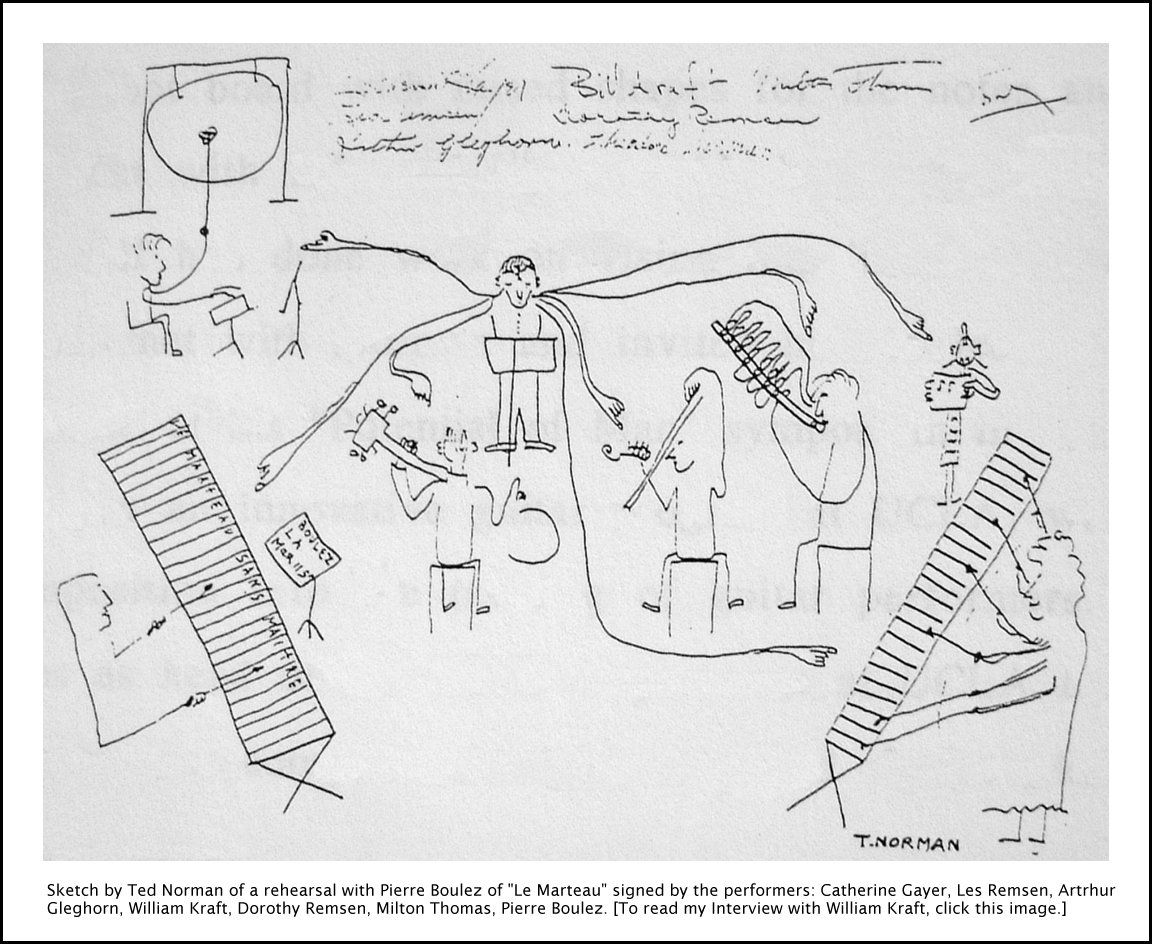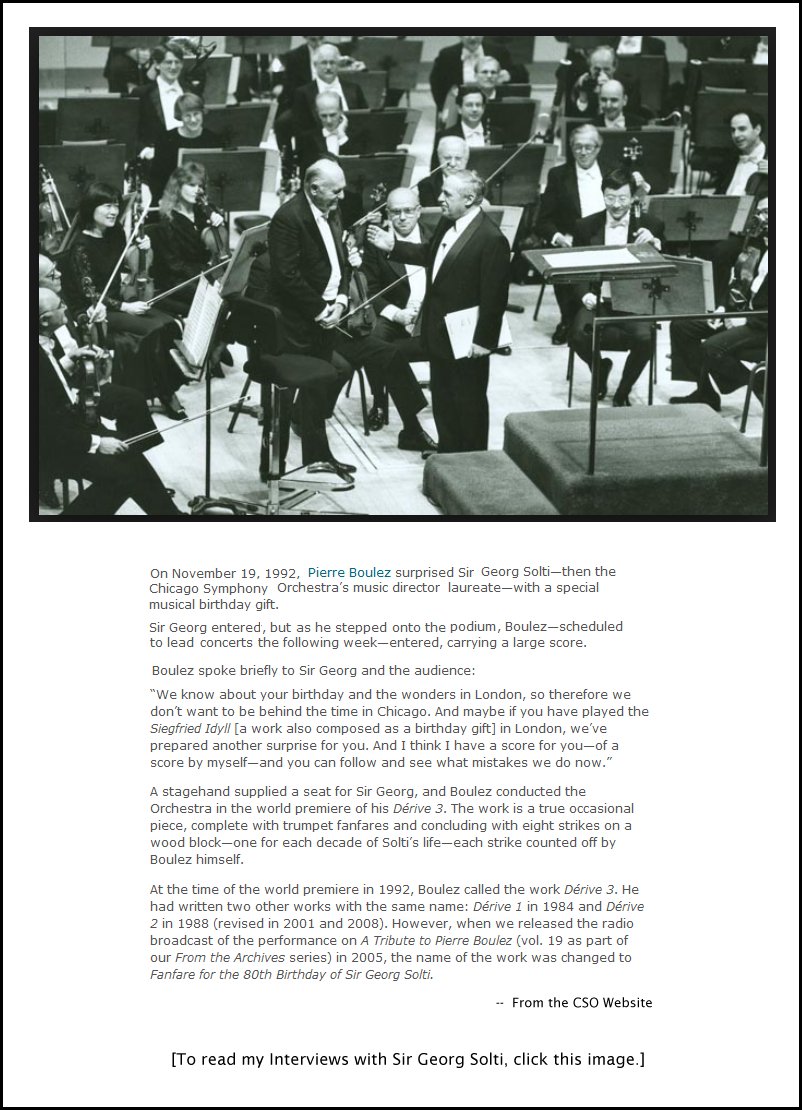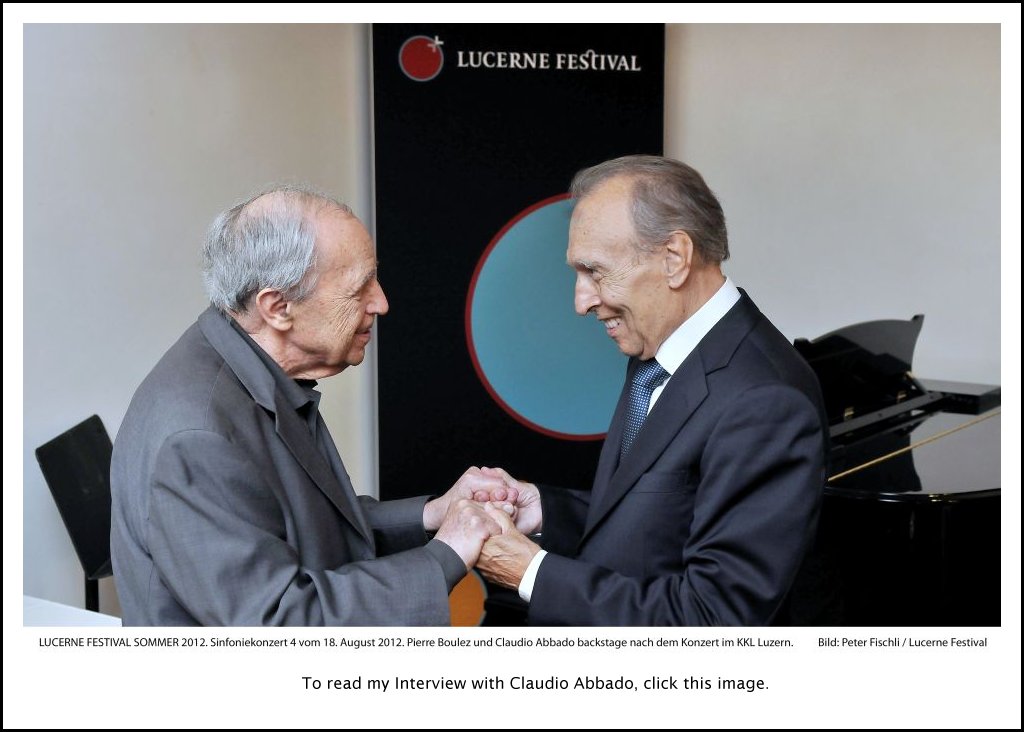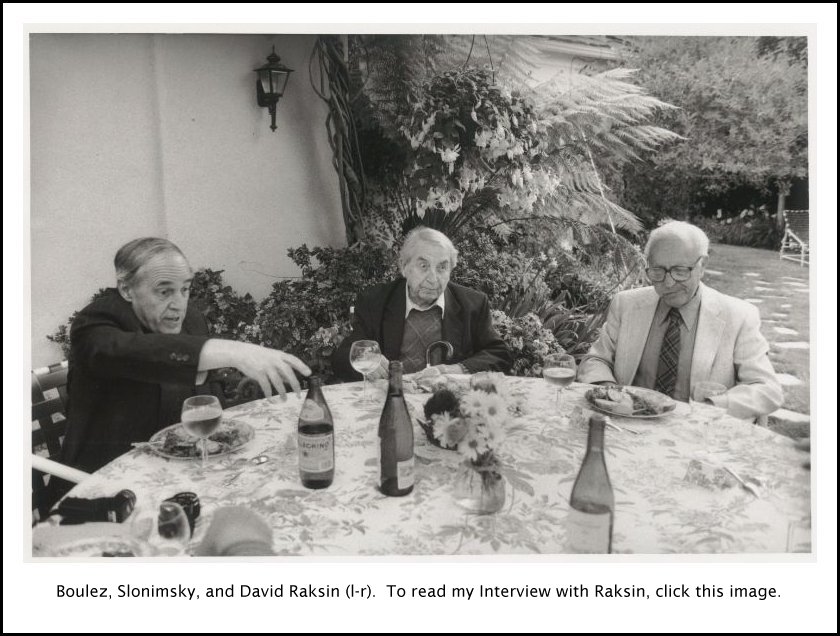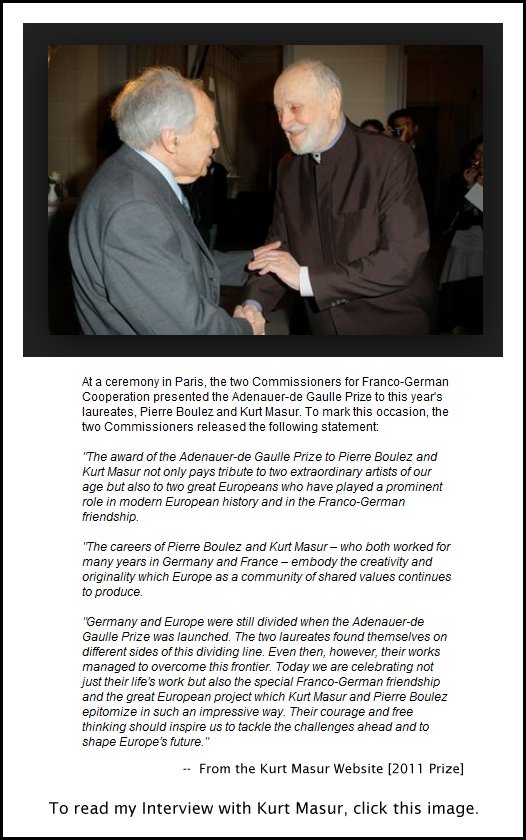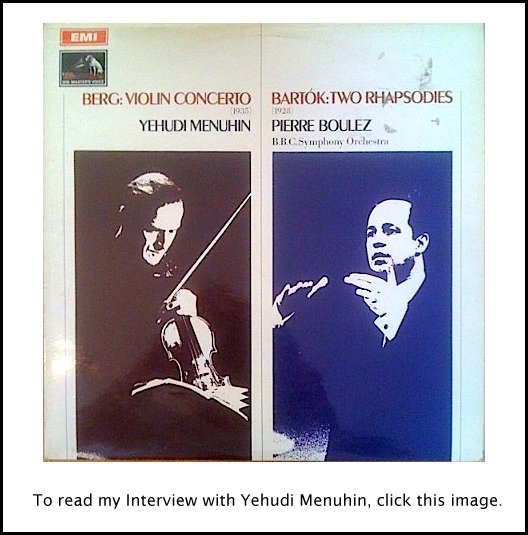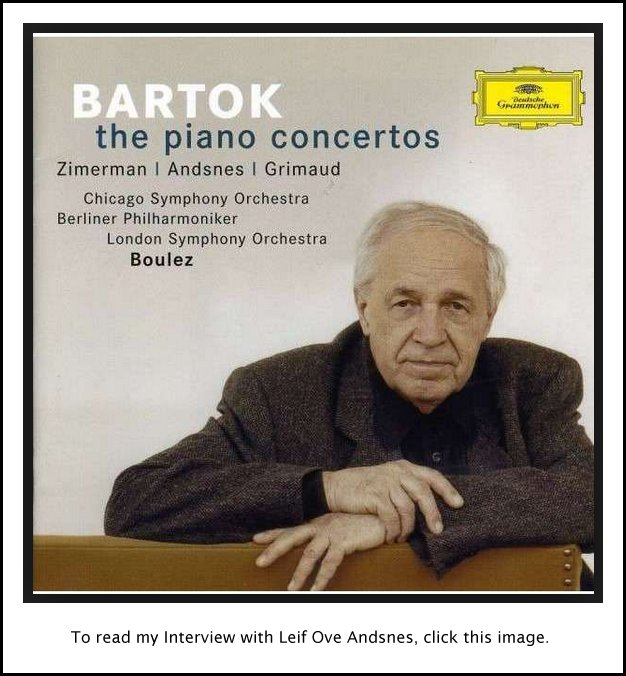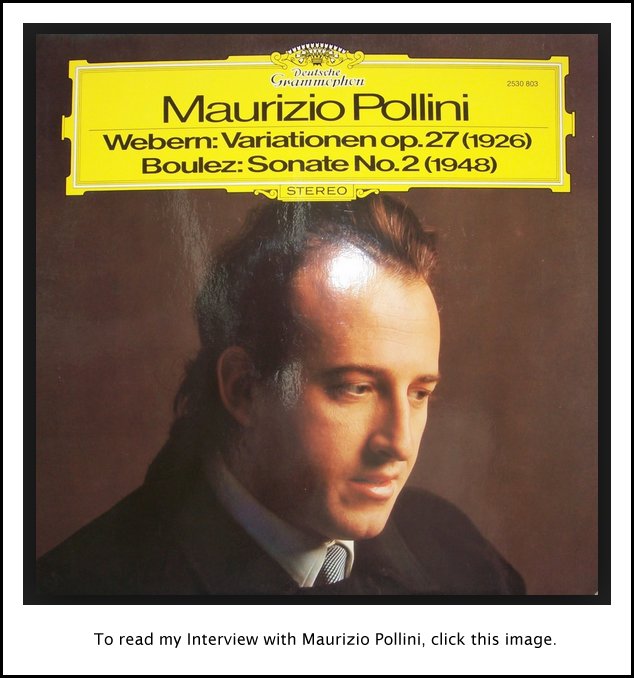Pierre Boulez Interviews with Bruce Duffie . . . . . . . . . (original) (raw)
Composer / Conductor Pierre Boulez
Two Conversations with Bruce Duffie
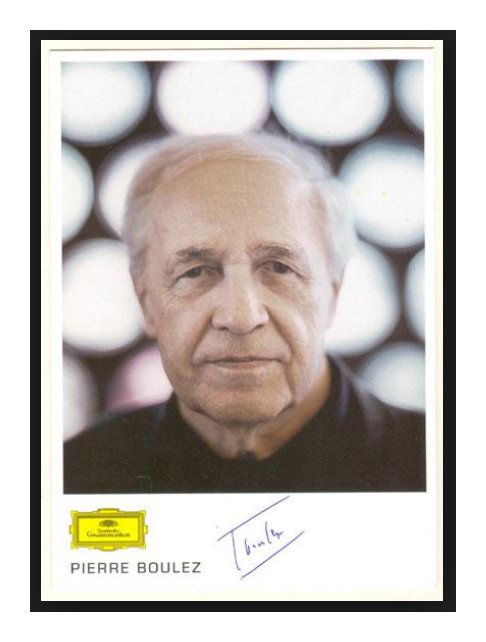
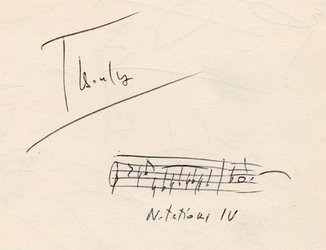
Pierre Boulez was born in 1925 in Montbrison, France. He first studied mathematics, then music at the Paris Conservatory (CNSM), where his teachers included Olivier Messiaen and René Leibowitz. In 1954, with the support of Jean-Louis Barrault, he founded the Domaine musical in Paris – one of the first concert series dedicated entirely to the performance of modern music – and remained their director until 1967. Boulez began his conducting career in 1958 with the Südwestfunk Orchestra in Baden-Baden, Germany. From 1960 to 1962 he taught composition at the Music Academy in Basel. As a composer, conductor and teacher, Pierre Boulez has made a decisive contribution to the development of music in the 20th century and inspired generations of young musicians with his pioneering spirit. His recordings have earned him a total of 26 Grammys and vast numbers of other prestigious awards.
The very brief biography above hardly begins to do justice to this giant of music
— not just Twentieth Century music, but all music.
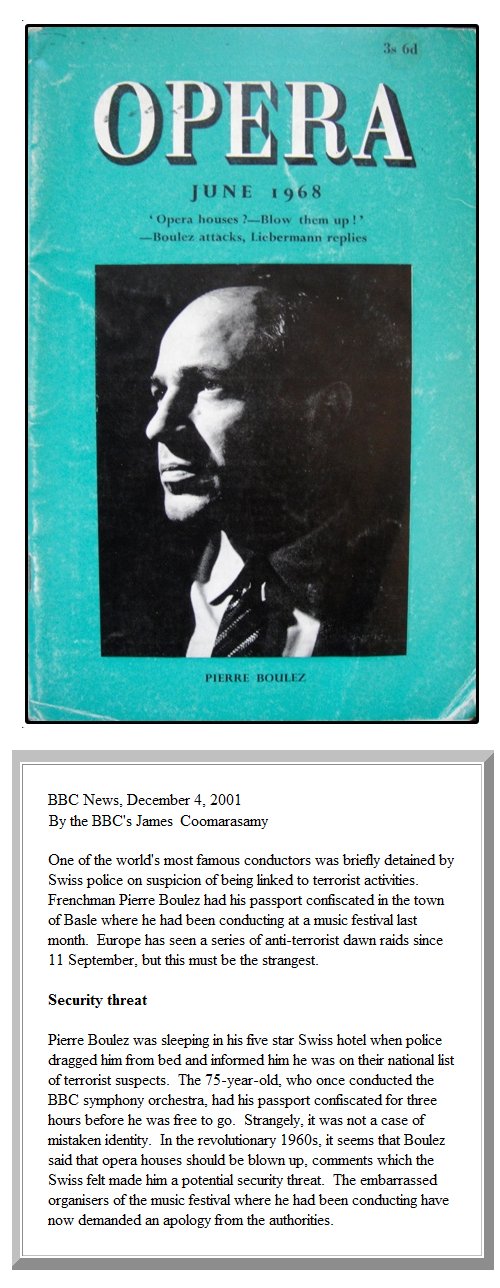 This website presentation is being prepared as we celebrate his 90th birthday, and the honors and accolades being heaped upon him are surely appropriate and at the same time inadequate. He is, quite simply, Boulez, and to speak his name instantly inspires anticipation, reverence, and respect. The rest of us can simply thank him for all that he has done.
This website presentation is being prepared as we celebrate his 90th birthday, and the honors and accolades being heaped upon him are surely appropriate and at the same time inadequate. He is, quite simply, Boulez, and to speak his name instantly inspires anticipation, reverence, and respect. The rest of us can simply thank him for all that he has done.
Though generous and open to so many, it was a distinct pleasure for me to greet and chat momentarily with this man on several occasions. He also graciously allowed me to sit with him twice for lengthy interviews, both of which are presented here.
These two meetings took place in Chicago in the mid-1980s, while he was in town for performances with the Chicago Symphony Orchestra. He had conducted here regularly and often, but did not yet have the official title which was bestowed about a decade later.
The interests of this man range far and wide, and so did our discussions. We did not focus on any single item, but in the first conversation we talked quite a bit about opera, and in the second we spoke about his own music and his ideas concerning new music in general.
I began with something that haunted him even back then, and, as seen in the box at right, later quite seriously disrupted his life . . . . . . . . .
Bruce Duffie: [With a gentle nudge] First, are you glad that the opera houses were not blown up twenty years ago?
Pierre Boulez: [Laughs] I think the title has done more, in fact, than the article itself, unfortunately. I don’t accept the conditions of the repertoire theater, generally, when you have no rehearsals and changing casts, and all these kinds of things. I don’t accept that now any more than I accepted it twenty years ago. Therefore, I conducted myself only in the specialty concerts, for instance, in Bayreuth, when you don’t have all that and you concentrate for a period of time on the production. Many people are really sharing this opinion now, that the time for rehearsals should be bigger, that rehearsals should be plenty for performances, and the whole thing should not be in an opera house. All these conditions are there, and then some in the opera house can go further, I suppose.
BD: Even for a piece that the conductor and the orchestra and all in the cast have done many, many times?
PB: That depends on what is considered as many, many times. If you have it in a repertoire theater
— even a piece which is very well known— after six months without any rehearsal the performance cannot be very good. You have conditions there which no symphony orchestra would accept. They could give you at least two rehearsals, and they’re done. One cannot forget the problems of the opera house are much bigger than the ones of the symphony orchestra, because you have the singers, the production, and everything has to be rehearsed. Otherwise it is kind of a perpetual improvisation. I am sure that you have seen this type of performance, which is just pure improvisation from beginning to end, thrown together. I don’t think that’s any way to do it, artistically speaking.
BD: [Playing Devil
’s advocate] There’s no spontaneity? There’s nothing there that holds it together?
PB: No. That’s an idea if it works, but each performer has his own spontaneity and they don’t go together very well. You have no kind of connection anymore because nobody knows what the next will do, or only knows it very vaguely. The notion of theater now has grown very tight. For instance, when I worked with Chéreau we had a singer who was sick, and it was very difficult to replace him with only two days
’ noticebecause the production is like for actors, and you know very well that actors are not replaced that in their productions. One should consider that the production of an opera is like the production of a play, which is very intricate at times and should be very enticing. If you just put one singer on the left and one singer on the right, it is not enough to be very dramatic.
BD: Then let me ask the
‘Capriccio question’.Which is more important, the text or the music?
PB: Strauss didn’t know the answer! [Laughs] He was precisely avoiding to give an answer, and I think you cannot give an answer. The relation between the text and the music is a relation which is constantly changing. You can’t say today. In Mozart arias the music is more important, but in the recitative you should understand absolutely what is going on, and you should understand the words. Otherwise you don’t follow the action and you are always in a fog, and that’s not enticing. I am sure that in the music, even for Strauss himself, in Ariadne you don’t need to hear the words of Zerbinetta to understand what she sings because coloratura is not always for pronounced words. But the first part, the dialogue with the Composer, especially, is important to understand. There’s always these fluctuations in the music which the composer composed very thoroughly, sometimes. Even in the most continuous music, like the music by Wagner, you have places where certainly the words are very important. In a lot of his prose writings, Wagner says that his text and his music are one entity, and you cannot divide these, and I think he’s right. Even in Wagner you should be able to understand constantly the action and the words, but it is not, of course, that the music as a second level.
BD: Should opera be in translation for the language of the audience?
PB: I don’t think that, but in a very funny way television can do justice to the arts. Subtitles are really the thing which can help. I had this experience where people who looked at the Ringby Chéreau and myself, which was broadcast in France and in England with subtitles. People never could understand that well the relationship between the text and the music, but the text was conceived with German sonorities, and the sonorities are so really tied with the music that you cannot really take another language
— especially if people don’t know the story, which is rather complex in the Ring. If they don’t understand at all what is going on, it is very difficult, and you cannot oblige people to read all the text before, to memorize every moment. Even then, they cannot enjoy the music at the same time because they will use such an effort of memory. Then the music will just be swallowed without really being conscious of it. All the attention will be for the text, and I don’t think that would be a good thing. But if you hear the sonorities and you can read the words — which are two activities— at the same time, you can really manage very well without being disturbed. Then the audience can react like a musician can react when he reads the score, because he has the time to see all these precise and very fastidiously composed relationships between words and music. That’s an enjoyment, because when you hear, for instance, a big splash of music, if you understand vaguely, that’s already something, but if you understand precisely, that’s much more satisfying.
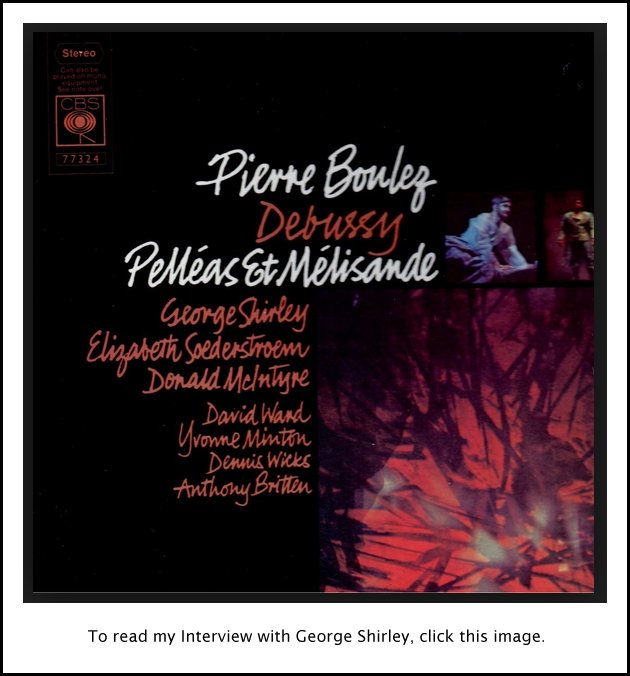 BD: Have you worked with the supertitles in the theater? [Remember, this interview dates from February of 1986.]
BD: Have you worked with the supertitles in the theater? [Remember, this interview dates from February of 1986.]
PB: No. By and large you cannot work with subtitles. You can understand when it’s in the sanctuary of German art you cannot really make them. You would have to have subtitles in three or four or five languages. The stage would be full of subtitles, and you cannot see the singers anymore!
BD: But here in America there is this movement towards using supertitles in the theater. I just wondered if this would carry out the translation very well.
PB: I suppose yes. If it is properly done I suppose it is a good thing, only it should not be obnoxious. For television it’s very simple because you put the subtitles down on the screen and it does not impair the image so much. Sometimes, if you have very subtle or very dark lightings and you have subtitles really in white, it distorts the image. But distortion of the image is not so terrible if you understand everything which is going on. In the theater, you’d have to put the subtitles at the top of the stage.
BD: That’s the way it’s done. It’s put on a small screen at the top of the proscenium.
PB: Yes. On the side?
BD: No, at the very top.
PB: At the very top, yes. So it is certainly more difficult to read that in a theater than it is on a television screen because the proportions are not at all the same. But if it can be done, then I would agree, certainly.
BD: Is there any other composer besides Wagner whose text and music are so wedded together?
PB: I don’t think there are because he was really the most creative person to have created his own texts. Although that’s very strange with Wagner because he wrote the text sometimes fifteen or twenty years before he set it to music. Therefore he was changing some of the words, but not very many. I have read a book on the difference between the sketches and the finished score, and he doesn’t change that much. He changed sometimes for the sonority, but that was more toward the end. Especially in Götterdämmerung, he changed much more for ideological reasons. He did not know how to finishGötterdämmerungproperly, and he had trouble to finish it because in all these years his ideology has changed completely. He did not know, really, what to make of it, finally.
BD: How do you see the last five minutes of the Ring?
PB: That’s a kind of compressed ending. For me, the music is wonderful but the theatrical experience is not terribly convincing, because everything happens. The Rhine is just washing everything out. The ring has gone back and Brünnhilde goes into the fire. Dramatically it is certainly not the strongest part, but the music is so beautiful that you forget about it. As a matter of fact, Chéreau solved this very beautifully. He finished with a question mark. All the people, all the crowd was there wondering at once what was happening. Finally the crowd was turning toward the orchestra, absolutely listening to the music without any movement, and looking at the audience in the dark. It was really this crowd on the stage looking at the audience, being a mirror of the audience in the middle of this music which was expressing just itself. It was an extremely beautiful moment. I think the Ring, theGötterdämmerung, is finishing on a question mark. Everything will happen again; there is no conclusion.
BD: Are you a better conductor because you are also a master composer?
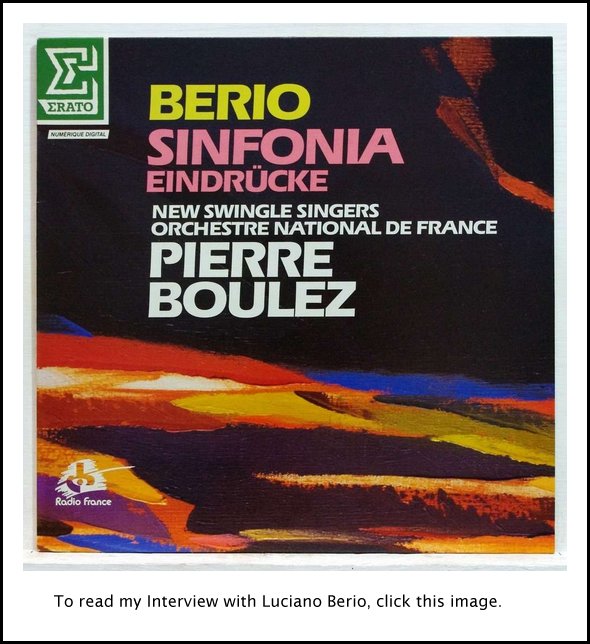 PB: Well, no, I don’t think I am a better conductor. I think simply maybe I conduct in a different way, because I know, really, more in depth what composition means. I am not the only one... for instance, George Szell, to mention him because I worked with him and was very close to him for some years. He studied composition and has composed, also. Furtwängler also has composed. Maybe the compositions of Furtwängler are certainly not the best of what he did, but he knew how to manage composition. Certainly if you really know what composition is as a practical matter, you are paying much more attention to some characteristics which otherwise you would not emphasize. For instance, if you are a composer you are paying very much attention to the long lines, to the tension of a scene, not only to have the exciting moments and in between you are swimming from exciting moment to exciting moment and reaching them when they are there. Also, if you are a composer you pay much more attention to the continuity of the development, to what motifs are doing. My attitude towards a motif in Wagner was not, “Oh, there is a motif so I will throw it out in a very loud way so everybody can recognize it.” On the contrary, the more I studied Wagner the more I thought that themes were part of the web, and sometimes you have to bring them out because they are very important moments. For instance, think of the turning point of a scene when the meaning changes, or when you have a theme which was tied with a situation but the situation has changed and this motif itself is changing, the harmony is changing. Then you have to emphasize this kind of thing, but otherwise you distort the web if you put always the motifs into a kind of position which is too prominent. Then you don’t perceive texture anymore, but you perceive only these important themes. So for me, as a composer, I’m very careful to bring the continuity, and I am also very careful with the instrumentation. That may be because when you write an orchestral score, you give a great deal of attention to the balance, to what instrument is more important than the other and to how the instrument should meld together. You don’t simply give a general impression of the orchestration, but I try to be as precise as possible, to observe as precisely as possible, the indications of Wagner himself. There is a book on Wagner by Nietzsche. He meant it, really, in a nasty way, but I think it was a big complement when he says, “Wagner is a master of the miniature.” He thought it was very derogatory to say that, but it is true because Wagner was extremely fastidious in his putting together his orchestral texture.
PB: Well, no, I don’t think I am a better conductor. I think simply maybe I conduct in a different way, because I know, really, more in depth what composition means. I am not the only one... for instance, George Szell, to mention him because I worked with him and was very close to him for some years. He studied composition and has composed, also. Furtwängler also has composed. Maybe the compositions of Furtwängler are certainly not the best of what he did, but he knew how to manage composition. Certainly if you really know what composition is as a practical matter, you are paying much more attention to some characteristics which otherwise you would not emphasize. For instance, if you are a composer you are paying very much attention to the long lines, to the tension of a scene, not only to have the exciting moments and in between you are swimming from exciting moment to exciting moment and reaching them when they are there. Also, if you are a composer you pay much more attention to the continuity of the development, to what motifs are doing. My attitude towards a motif in Wagner was not, “Oh, there is a motif so I will throw it out in a very loud way so everybody can recognize it.” On the contrary, the more I studied Wagner the more I thought that themes were part of the web, and sometimes you have to bring them out because they are very important moments. For instance, think of the turning point of a scene when the meaning changes, or when you have a theme which was tied with a situation but the situation has changed and this motif itself is changing, the harmony is changing. Then you have to emphasize this kind of thing, but otherwise you distort the web if you put always the motifs into a kind of position which is too prominent. Then you don’t perceive texture anymore, but you perceive only these important themes. So for me, as a composer, I’m very careful to bring the continuity, and I am also very careful with the instrumentation. That may be because when you write an orchestral score, you give a great deal of attention to the balance, to what instrument is more important than the other and to how the instrument should meld together. You don’t simply give a general impression of the orchestration, but I try to be as precise as possible, to observe as precisely as possible, the indications of Wagner himself. There is a book on Wagner by Nietzsche. He meant it, really, in a nasty way, but I think it was a big complement when he says, “Wagner is a master of the miniature.” He thought it was very derogatory to say that, but it is true because Wagner was extremely fastidious in his putting together his orchestral texture.
BD: The details?
PB: Yes, all the details of the orchestration, which are really very well-conceived. For instance, the balance against three clarinets is two oboes and one English horn, or he has two bassoons and two clarinets. Even the weight of the instruments he’s calculated with extreme precision, and you cannot forget that! But at the same time you have these sweeping lines, and that’s very difficult for me, in Wagner, to bring together the extreme precision of this texture and in the same time the long lines of a theme. That’s this contrast between miniature and fresco, which is so difficult to obtain in Wagner.
BD: What do you expect from an audience, and is it different when you’re the composer, as opposed to the conductor?
PB: Yes, because when I conduct that which I have not written, I am certainly involved, but I am not reflecting on the work in the same way that I am reflecting when it is a work which I have written myself. When I have written the work myself, especially when the work is fresh
— a month or so or even the previous week when it is a chamber work— then I am not sure how to perform it. I have to do a couple of performances to be absolutely sure of how I will manage all the things I have thought and how it translates in practical gestures and its many sonorities. This is not a difficulty, but you certainly have to concentrate on the way of looking at your score and saying, “Yes, I want that, and how will I realize it properly?” But if I have an old score, for instance the scores I have written in 1950-1955 like Le Marteau sans Mâitre, then I have no difficulty, because the distance is such that I consider that like a score of the past. I like them much better than I did 30 years ago, not only because I have learned quite a lot in conducting more and more, but also the distance from the score is benefiting these performances. It’s the same for the classical works — the works of the past, even of the recent past, such as the Vienna School or Stravinsky. When I was very involved in discovering the scores, I did not know how to manage them properly. But now that there is a distance and I have gone through the score quite a lot of times, it’s like a car race. The driver has to discover a curve here and a right line in a part of it, and then another curve. Then he knows how to manage these curves, and all these differences in the run.
BD: A race car driver would say that he doesn’t know how fast he can take a curve until he’s taken it too fast. Is there an equivalent in music?
PB: I think that’s exactly the same because sometimes you know that you have to give so much more energy in one part than the other part. Then you give too much energy and that’s wasted because you know that maybe later on you have to give more energy than the previous point. When I conducted the Ring for the first time, I was thinking all the time, “Here I must give more, but not too much because there is still to come the end of the scene,” and so on and so forth. You have to think about that each time, and that of course you can manage, but that’s very tiring. It might not be a natural gesture, but when you have done it a couple of times, after five years, for instance, I do not have to think anymore. I was giving the energy, and compensating sometimes when, for instance, a place was a little bit too slow because the singer wanted to take a slightly slower tempo. Perhaps his voice was not in as good shape as it was previous series of performances. I can understand that. You cannot be rigid in these performances. You have to take in consideration everything. Also the production is very important. If a singer has gone a little too far, you have to give way and observe what he does on the stage. You have to listen to that, but you react by feeling more than by thinking. That’s the progress you make, always, when you are dealing with a score over a number of performances. At first you are concentrating on the fact that you are doing that, and that, and that, and that. Then afterwards you don’t think anymore, but you react naturally because the score is not in your head but in your hands. There is no transmission time, let’s say. You have direct contact to the score with your hands. That’s the great advantage when you do a series of performances, that at the end you don’t have to think anymore, but you just feel the score.
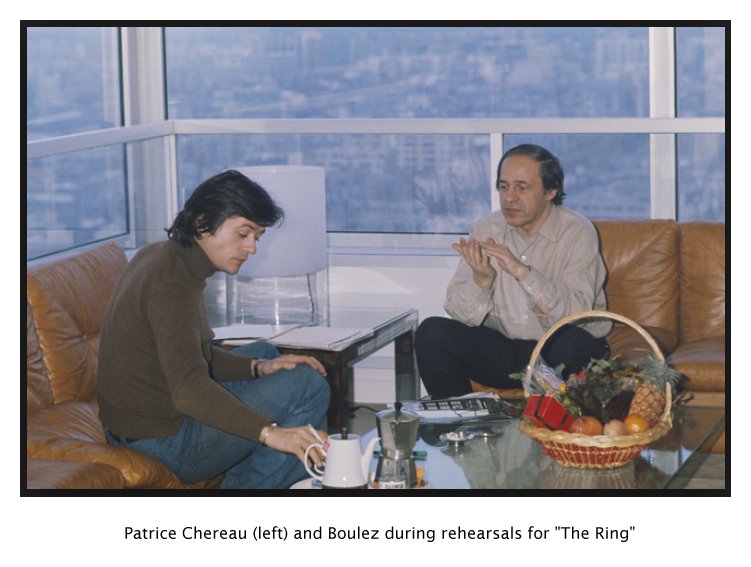 BD: Is opera then more a collaborative art between the conductor and the performers than a symphony?
BD: Is opera then more a collaborative art between the conductor and the performers than a symphony?
PB: Oh yes, much more. In each performance I have done, I was always there from the very, very beginning. I don’t want to be at each rehearsal of the director, because it can be annoying for the director to have always somebody with him. Sometimes he likes to work completely alone with a singer and just a piano for rehearsing. But when there are important rehearsals, then I prefer to be there. First, I can follow what the director is doing, and second, I can tell him, “We love this movement but it does not move with the music.” Physically, if you ask the singer to just run at this point, he cannot sing easily a phrase after that. Or if he does this movement at this point, it will disturb the flow of the music. I prefer to say that before, rather than be confronted with these problems at the last minute, when people have already studied the production and it is difficult to change something. The change will be always like a scar, then, but if you do the change at the beginning, then it’s an organic process of development.
BD: You’re helping to mold it?
PB: Yes, exactly. I attended not all the rehearsals of Chéreau, but I attended the main rehearsals, and I asked him, “Can I go do it this way?” and he was very happy. We also discussed it afterwards, right after rehearsal. I would tell him, “I think that and that and that, but you could do more at this place because the singer can really move there without any problem.” The production was absolutely his invention, but at some points I was mixing in myself, just to give some direction according to the music and the possibilities of the singers.
BD: Are producers today getting too much power, and taking too many liberties with scores and texts and stage directions?
PB: With scores, certainly not. Nothing was done with the score as long as I was there.
BD: But I mean, in general?
PB: In general I don’t think the score is touched. The score is never touched, but certainly some productions have a super-structure of the staging compared to the score. I don’t find it very interesting when you have so-called
‘ideas’. This type of production is disturbing when you want to change the time and change the psychological relationship, and you want to say, “Now I have understood what he meant.” All these kinds of directions are sometimes even very childish. But I find a production should go into the text, and not only as a decoration. A production should really look at what is in the music and in the text, because both are important. When a musician has composed the music, he has the text in front of him, and he thought of the text. With the productions of Chéreau, of Luluor the Ring, certainly he emphasizes some details. I remember something which shocked the people, especially in the first year, was the scene with the bird in Siegfried. The bird was in a cage, and that shocked people out of proportion. They wondered why he did that because it is very strange. If you look at the text of Wagner, Wotan is maneuvering Siegfried all the time, until the break when they fight and both are defeated. But until then, he maneuvers, always. Siegfried is the least free of all people because he is constantly maneuvered. Then this bird, which should bring him to Brünnhilde, is also the will of Wotan, because he has to deliver Brünnhilde. So how to show on a stage that the bird was also the will of Wotan is very difficult.
BD: So he put it in a cage!
PB: Wotan put it in a cage.
BD: Even though Wotan himself says that he is the least free of anyone?
PB: Absolutely! And it’s very difficult to show that. You have that in the text, but if you have to show something like that, the cage was an idea which was not in the text of Wagner, but which was not at all against the meaning of the text. It was just a symbolic transcription of what the text meant, and people took it as a real thing in spite of the fact you don’t find any birds in a cage in the forest, especially in the wild forest! But as a symbol of the absence of freedom of Siegfried, it was really the best symbol.
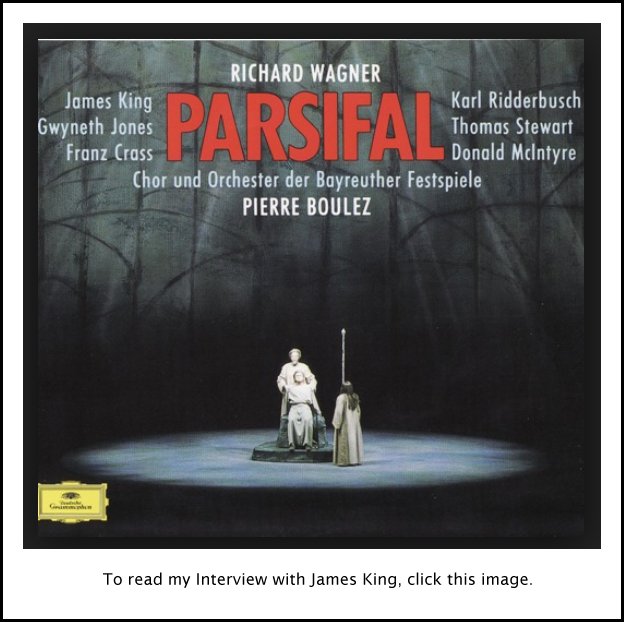 BD: You have said that all music should disturb. Should the stage directions also disturb?
BD: You have said that all music should disturb. Should the stage directions also disturb?
PB: I suppose they should disturb. They should bring the light of our period on a piece. You cannot even do revivals, and that’s really very strange. I have seen revivals of old stagings, even those of just ten or fifteen years, and because the art of the stage is something which is so tied with the actuality, so tied with the period itself, immediately when you have ten or fifteen years in between, you see a production is aging progressively.
BD: Would this be different if it were done each year for those ten or fifteen years?
PB: Yes, if the director himself modifies it. I would like to tell you how Wieland Wagner reacted. Wieland Wagner’s production of Parsifal was begun in ’51. I came to Bayreuth in ’66 to work with him, and during all these years it changed constantly. It was the same production, but at the same time it was not the same production. There were some major changes. So in ’66 he told me, “While you are here now I want to change it completely, because I cannot change something here and something there when the musical direction has completely changed.” He told me, “You bring another point of view, and my point of view was fitting with Knappertsbusch. Now I feel absolutely I must change that.” Unfortunately he died that year, so we did not work on that. But afterwards his production was maintained for a certain number of years with somebody very competent to maintain it, but only to maintain it. Then the production aged instantly. It was like the scene in Rheingoldwhen there is no apple anymore, and then the gods are aging instantly! This production, without his kind of rejuvenation of each year, just was growing older and older and older, and after a certain number of years it could not be maintained anymore, because it was the style of Wieland Wagner, the style of the fifties. Then you see how much the stage production is tied with the period, even when there was a genius. But this genius does not survive. That was due to some circumstances, due to some very precise meeting of some talents, and then, when those talents are no more there, there is another generation, another time, and you have to change completely.
BD: Is it your basic complaint about opera houses in general that they are dying, that they have withered on the vine?
PB: I think my complaint is that they don’t give the best conditions for performance.
BD: So it really has nothing to do, then, with repertoire?
 PB: It has nothing to do with repertoire, no. I would like that the repertoire could be expanded, and people would be more curious and more curious to put in the repertoire of accepted masterpieces but which are performed once in a blue moon. Wozzeck should be permanently included because as a story it is as exciting as Tosca. That’s exactly the same type of opera drama, and I am sure that with good production, and with the music really put together very well, Wozzeck would be a normal repertoire piece. It is not.
PB: It has nothing to do with repertoire, no. I would like that the repertoire could be expanded, and people would be more curious and more curious to put in the repertoire of accepted masterpieces but which are performed once in a blue moon. Wozzeck should be permanently included because as a story it is as exciting as Tosca. That’s exactly the same type of opera drama, and I am sure that with good production, and with the music really put together very well, Wozzeck would be a normal repertoire piece. It is not.
BD: [Gently protesting] Some people think that it is becoming a normal repertoire piece.
PB: If you perform it once every four or five years, I don’t think that’s repertoire. That’s the point. As a matter of fact, Wagner is not terribly repertoire, either. How many times do you see Parsifal? Parsifal is not performed very often in all theaters. What is performed by Wagner are the early pieces, mainly Tannhäuser and Lohengrin and Meistersinger andTristan. But full cycles of the Ring are very rarely performed because, first of all, economical conditions are enormous! But the theater is there for that. If you cannot manage that, then your ability is put into question. I don’t know if it is still the case now, but when Solti was in Covent Garden, there was a Ring cycle at the beginning of every season. I find that’s normal because that’s one of the most important works of the nineteenth century; also the operas by Mozart. You see sometimes some performances that are terribly routine, and I don’t find them always very exciting. For instance, if you hear Così fan Tutte, which is a very difficult opera to perform, what you hear is not really terribly satisfying all the time.
BD: As you say, the repertoire should be expanded. Are the obstacles to contemporary opera the same or different than they were twenty or thirty years ago?
PB: They are more or less the same. Most of the people in the opera houses do lip service to them due to lack of interest and conviction in presenting the works. They don’t take the best singers. They always take singers who are less used in the house and can do that assignment. World-class singers will never touch that assignment.
BD: Would a contemporary opera work better with a Domingo, rather than a young singer who is more into contemporary?
PB: No. If he is a very good young singer, certainly it works better. But I don’t see why a star could not devote part of his time to a new work, if he’s interested. And it doesn’t apply only to new works; it applies to production. I don’t consider that either a conductor or a singer does justice to a production if he comes only four or five days before the premiere, and that is very often the case. You will never expect that from even a star actor! He will be always there for the rehearsals, and really be involved from the beginning to the end. The singers take that very lightly, much too lightly for my taste.
BD: Is it possible for something to get over-rehearsed, perhaps like a Felsenstein-type production?
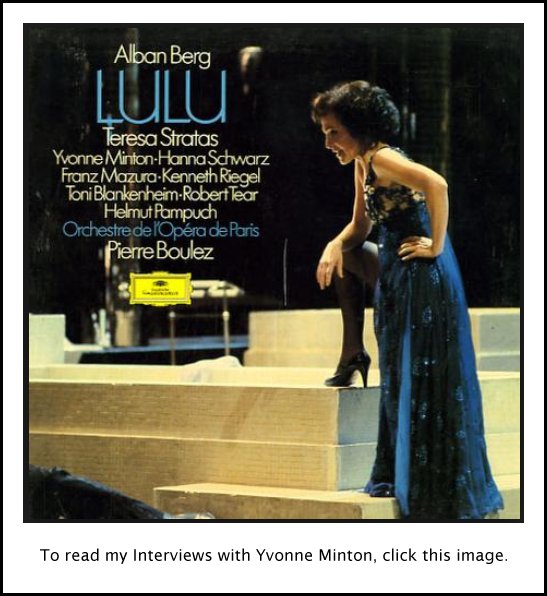 PB: Yes. You cannot exaggerate in the other direction. If you are six months in a production, of course everybody will be bored to death, although with Felsenstein, it gave some stunning results, I must say. But the Lulu production was one full month of rehearsals, and one full month of rehearsals can be accepted by any singer for a new production if he is conscientious. A revival takes less than that, but a first production should be no less than one month. But the life of an opera house is organized in such a way that people have to sit there for rehearsals for one month, and nothing else is proposed to them. In an opera house you could organize in the same time concerts, recitals, also periods of teaching which will be very profitable for everybody. The great singers begin to teach only when they are all out of dollars, and I find that a pity because they can rely only on their past for the style. But a great singer could give some master classes when the production is in rehearsal, or could give some recitals or some concerts with orchestra. You could find either a similar work, or works by the same composer who has composed this opera, for instance. When one rehearses Lulu, you could give the Altenberg Lieder, for instance, in a concert, and that will be of interest for the singer because he will not sit there and have the impression of doing nothing but rehearse, which is a kind of dead period for him. If you could excite his interest in other activities, this would be a good thing. But the whole conception of an opera should change to be able to propose that to the singers. Then it will be another involvement; it will be interesting, and they would have a tendency to stay where they are, and not just to go from one place to another one.
PB: Yes. You cannot exaggerate in the other direction. If you are six months in a production, of course everybody will be bored to death, although with Felsenstein, it gave some stunning results, I must say. But the Lulu production was one full month of rehearsals, and one full month of rehearsals can be accepted by any singer for a new production if he is conscientious. A revival takes less than that, but a first production should be no less than one month. But the life of an opera house is organized in such a way that people have to sit there for rehearsals for one month, and nothing else is proposed to them. In an opera house you could organize in the same time concerts, recitals, also periods of teaching which will be very profitable for everybody. The great singers begin to teach only when they are all out of dollars, and I find that a pity because they can rely only on their past for the style. But a great singer could give some master classes when the production is in rehearsal, or could give some recitals or some concerts with orchestra. You could find either a similar work, or works by the same composer who has composed this opera, for instance. When one rehearses Lulu, you could give the Altenberg Lieder, for instance, in a concert, and that will be of interest for the singer because he will not sit there and have the impression of doing nothing but rehearse, which is a kind of dead period for him. If you could excite his interest in other activities, this would be a good thing. But the whole conception of an opera should change to be able to propose that to the singers. Then it will be another involvement; it will be interesting, and they would have a tendency to stay where they are, and not just to go from one place to another one.
BD: Is it a mistake on the part of the public to expect all new operas, world premieres, to be masterpieces?
PB: I have looked at the programs of the opera between 1875 and 1900. There were thousands of operas which were premiered and which never survived because they are really works of the time. If you had an opera which had no success, it did not survive after five performances at the most, and sometimes it had only three performances. Look at the example of the big works of Berlioz, which is very typical, in a way
— Benvenuto, Beatrice and Benedict, and Trojans.
BD: Trojans was never done completely.
PB: Never done completely at first, and only for a very limited number of performances. It was not successful, period! It was buried immediately, like all other operas. Trojans has musical qualities which allow it to survive, but anything which was not immediately successful was just dumped. What was successful in the opera in Paris was mainly Rossini and Meyerbeer, period. Wagner was not successful until 1890s. Otherwise, there were very few performances. And if you look at the life of the big time of the opera houses, there were a lot of very poor works.
BD: Should the opera houses of today be doing more new works a few times and then letting them be dropped?
PB: I don’t say you cannot do that, because repertoire establishes itself in a more powerful way, but in a year, if you choose well, you could very well do two or three first performances, and it would not really be a burden to the house which does that. As a matter of fact, that’s what Liebermann did when he was in Hamburg.
BD: But that’s an isolated case!
PB: Yes, because he was Liebermann! It needed personality to do that, and as long as you have the personality, you have the results. It needs conviction. You have to be convinced, and Liebermann was convinced of that, and they needed it.
BD: Can we ever hope for an opera from Pierre Boulez?
PB: Yes. Maybe not an
‘opera’in the conventional sense, but a work for theater, certainly.
BD: Thank you so very much for speaking with me today.
PB: You are very welcome.
BD: You’ve been very gracious. Merci beaucoup, Monsieur!
PB: [Laughs] Très bien!
We now move ahead just over twenty months for the second encounter in late October of 1987.
BD: [As we both get comfortable on the sofas in his suite] So, where is music going today?
PB: Who can tell? [Laughs] I suppose that’s exactly the type of question you can never answer.
BD: Is that even a question we want to try and answer?
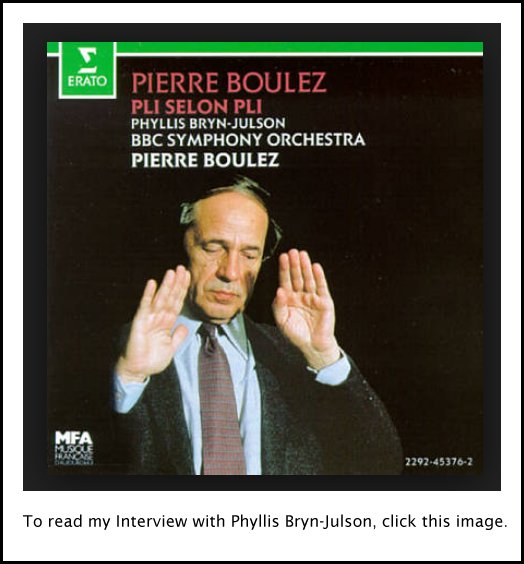 PB: No, certainly not. I’m not really interested in prophecy and saying,
PB: No, certainly not. I’m not really interested in prophecy and saying,
“Oh, music goes that, and in ten years you will see, or fifteen years or the near future even.”That is something which is interesting. That’s a surprise, and if you had told me that I am now where I am, I could have believed it or not believed it. But it would not have been of any kind of importance because I could not materialize myself into the future. I am certainly detached and I’m living in the moment, but of course I’m thinking about what I will do. What I would think so for the future is a strong direction, but that’s a guess always. Nobody can tell anything.
BD: If you can’t tell where music will be later, what direction is it heading at this moment?
PB: At this moment there are a couple of developments which interest me. I don’t see that’s development of music generally speaking, but there are a couple of developments which for me are interesting. First is the expansion of material of music. I have made very often this comparison but it’s like architecture at one point was really changing because of the change of material. If you can build sky-scrapers because the materials changed, the style has changed as a consequence of the discovery of the new material. That is where music is, at the beginning of a period where a lot of new material will appear at the disposal of the composers. The new material is like electronics, for instance. You can tell me that’s not that new because it began something like forty years ago.
BD: Are you a creator then of new material, or are you a user of whatever material is around?
PB: The question is not that simple. You don’t just have new material at your convenience without looking for it. The thing is just to look for new material and to investigate in this direction, and to provoke the birth of new material. That’s a kind of action which is reciprocal. You might have new thoughts of a musical expression or musical intentions which cannot be fulfilled by instruments because you cannot have the right intervals or you cannot have the right colors or the right material. You look at how you can do that. Generally there is a meeting point between the research and the creative power. The creative power could not go without this research, but research without creative material, power would be nothing. When I began with colors some fifteen years ago, I was thinking of that. A musician alone cannot think and cannot find all kinds of new material if he’s not helped either by a group of people or an institution which will care for that. Then he’s facing then a situation which is lighter for him because he can benefit from a group activity, although composing and creativity will remain highly individual. The way of using this material will remain individual, but this discovery of the material can be a group activity.
BD: Are you pleased with all of the new developments, or are there some blind allies that we have uncovered?
PB: You can’t say they’re blind allies. It depends on how the people use them. Sometimes there is a possibility and composers don’t use it properly, or they did not have enough time, or they didn’t have enough persistence, or they will be fooling themselves with idealistic possibilities which are not really possible right now. So you have all kinds of difficulties and all kinds of problems, but that’s a normal situation. I’m never really astonished if you have problems in your way because you know very well things are not simple. Maybe retrospectively you
think it was absolutely logical to do that, but before this logic was discovered, this logic was very hidden and not absolutely obvious.
BD: You say
‘use it properly’. Who makes the decision of what is proper — is it the musical community, is it the audience, the critics, the historians?
PB: That’s what I mean, it’s a mixture of everybody. I don’t think any kind of group makes the law or decides what is good and what is not good. You have a vast variety of choices with many personalities. Of course you have personalities which are stronger than other ones, but it’s not always the strongest personalities who develop the background. Certainly there are some composers who are not really at the forefront, but who have developed ideas which are very interesting. Let’s take, for instance from the past, the example of Varèse and Stravinsky. The complete works of Stravinsky are much more striking as a force in the twentieth century, but Varèse was maybe, in some parts, more inventive, and the fact that it was not fully achieved allows people to be begin with that and to take these ideas which were not completely put to the most achievement as a point of departure. From this point then they can read and develop many things. On the contrary in some of the pieces of Stravinsky that’s a universe which is closed because all the possibilities are explored. You must be very inventive to see what he used and how he used the methods, and then to develop from this point something which is more important, or differently important from what he did. But that’s much more difficult with a composer with a very strong personality than with a composer with a less strong personality, or with an output which is smaller or less striking at first.
BD: In your own music, do you strive to use all of the possibilities, everything that is in the kernels of invention?
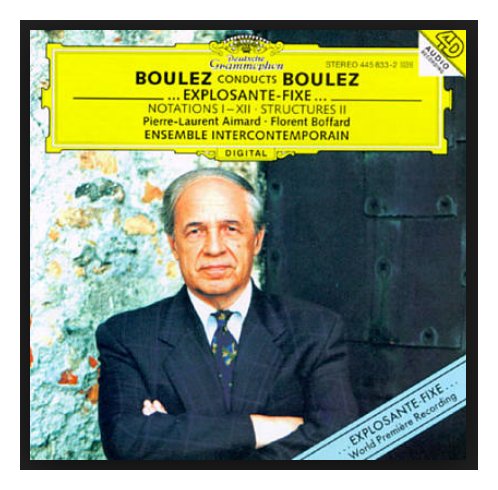 PB: I try to use them one by one. [Laughs] You cannot eat all the food of the world at once! When you are having a walk in the woods, you don’t take every path and you don’t look at every tree. You are trying to make your way, and to go from one point to another one and even to discover things, but you don’t explore everything. I suppose that’s the way of a musician. It depends also from the circumstances of his life, the points in his life, and how his mind is working at certain moments. Sometimes you can discover vast territory with a lot of things which are just seen like that and which are just taken on the surface, and sometimes he goes much deeper in a corner which is more interesting, and he explores this corner really very deeply and to the point where it is exhausted. Then when this is exhausted, he can go further, and maybe find that it is not completely exhausted, so he goes into another corner and back to the earlier corner. We are like animals which have the winter in front of them, so they accumulate small things. They know they have a fortress of their own on which they can survive during the whole winter. When you are very young you accumulate knowledge, and progressively you have the opportunity of using this knowledge and of accumulating other things. This knowledge will be part of your life, and part of your sources of energy constantly. You see someone at eighteen or twenty. Then when you see them after twenty or thirty or forty years, you don’t see them at all in the same light. The characteristics of really important works are mainly already made, so you can see quite a lot of things according to your own development because they are reflecting you very well. Works that are not very important are not reflecting very much because they’re not good mirrors, but very important works are terribly good mirrors, and they reflect and they enlarge what you are able to see of yourself. You are drawn to something the writer says about literature, and it is exactly the same meaning in music. Important works speak to you not about themselves but they speak about yourself, and that’s exactly what I think about when confronted with the past. They are speaking of yourself, and not the contrary.
PB: I try to use them one by one. [Laughs] You cannot eat all the food of the world at once! When you are having a walk in the woods, you don’t take every path and you don’t look at every tree. You are trying to make your way, and to go from one point to another one and even to discover things, but you don’t explore everything. I suppose that’s the way of a musician. It depends also from the circumstances of his life, the points in his life, and how his mind is working at certain moments. Sometimes you can discover vast territory with a lot of things which are just seen like that and which are just taken on the surface, and sometimes he goes much deeper in a corner which is more interesting, and he explores this corner really very deeply and to the point where it is exhausted. Then when this is exhausted, he can go further, and maybe find that it is not completely exhausted, so he goes into another corner and back to the earlier corner. We are like animals which have the winter in front of them, so they accumulate small things. They know they have a fortress of their own on which they can survive during the whole winter. When you are very young you accumulate knowledge, and progressively you have the opportunity of using this knowledge and of accumulating other things. This knowledge will be part of your life, and part of your sources of energy constantly. You see someone at eighteen or twenty. Then when you see them after twenty or thirty or forty years, you don’t see them at all in the same light. The characteristics of really important works are mainly already made, so you can see quite a lot of things according to your own development because they are reflecting you very well. Works that are not very important are not reflecting very much because they’re not good mirrors, but very important works are terribly good mirrors, and they reflect and they enlarge what you are able to see of yourself. You are drawn to something the writer says about literature, and it is exactly the same meaning in music. Important works speak to you not about themselves but they speak about yourself, and that’s exactly what I think about when confronted with the past. They are speaking of yourself, and not the contrary.
BD: Are they speaking about the people who are alive at the time they were written, or are they speaking about the people today and tomorrow?
PB: Today and tomorrow. I was never really a great fan of authenticity and tradition because if you think this performance is authentic or that’s not the right tradition, there’s no absolute values in music or in literature or in art. That’s impossible because the relationship between a work and its time does not change. In art you have a painting which theoretically does not change. There is no change of the oil pigment, and in music the structure does not change. You can’t tell me that music is painted and nothing changes at all, but music to be heard has to be performed, and then the relationship the performer with the work is also something which is changing constantly, even unconsciously. For instance, listen to recordings of work which were made fifty or sixty years ago. You see the enormous difference between a work by Beethoven recorded by Furtwängler in the 30s the same work recorded by a young man right now. It has not the same vision, and that’s very sane because you don’t go back to a fixed image. This image follows you.
BD: So both these interpretations then are valid?
PB: Absolutely, absolutely!
BD: Are all interpretations valid?
PB: No. When you have distortions, that’s different.
BD: At what point does interpretation become distortion.
PB: That’s very difficult to say. Some things which seem right in a period can seem distortion in another one, so therefore I would not blame distortions unless you know they are blatant oppositions to the text itself. Yesterday I heard a tape of Mengleburg doing Mahler in 1939. You think,
“Oh my God. Did he really mean to make these big rallentandosall the time?” Although the playing is of a very high quality, now it seems to us a distortion. But at his time maybe that’s how people were accustomed to have the structure of the music shown in this type of very obvious way. In his time it was certainly not a distortion because a musician of his caliber would not have done it, but now it seems to us a distortion. Look at baroque music, with Bach especially. In the romantic time they were doing it so differently. You have all the recordings of Cortot, especially, which seem wrong to us today. It was like the sewing machine with no distortion at all. Everything must be ‘ta, ta, ta, ta’. Now there’s flourishes, there are changes of tempo and so forth. So what could have been really rejected as a distortion in the 30s, now is accepted as the real style!
BD: And our style will be seen as distortion perhaps twenty-five years from now?
PB: Exactly! Because on what are you basing interpretation? You are looking at some books, but you have no documents on eighteenth century music, not to speak of seventeenth and sixteenth century music. You have books only to rely on. You have no proper documents from the theoretical point of view, let’s say for the flourishments and for embellishments of the time. You just have books, but you do not really know how they were doing it. You have no documents on the tuning. It’s difficult.
BD: When you think about your own music, we have documents. There are even recordings that you have made of yourself of your music.
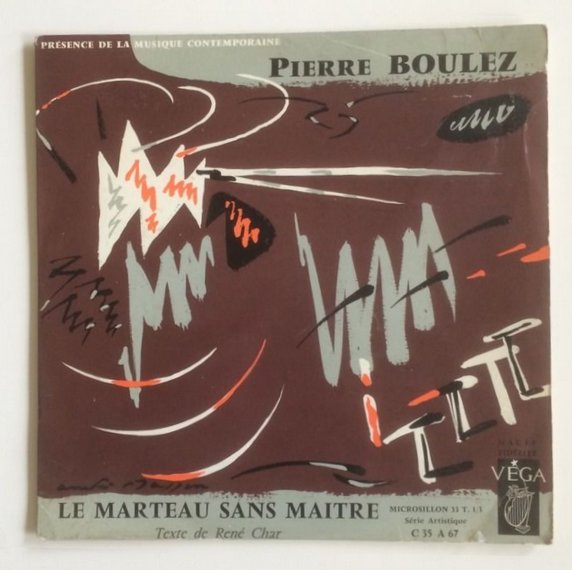 PB: Yes.
PB: Yes.
BD: There are also broadcasts so that we can listen a hundred or even two hundred years from now to exactly how Boulez conducted and performed his own music.
PB: Yes, but it does not mean that it was the only way of performing my own music. I see the difference between my own performance thirty years ago and now of my own works. When I listen to the old recording of Le Marteau sans Maître, which I made in ’56 [shown at right], I am appalled by the kind of uneasiness, and rather stiff tempi and so on and so forth. Now I am much more at ease with the music because I have a distance. I’ve played it quite a number of times, so now I can take that in my hand and make something out of it. [Boulez would make four subesquent recordings of this work.] But thirty years ago I was still uneasy, and I’m sure that’s with the first performance. I am very aware of that. The first time I perform a work of mine is like new shoes or a new jacket. You are feeling you have to move into it before it feels comfortable, before you feel that you can manage a performance. I remember very well the first time I played Notations. I was not too used to how to do that, how to rehearse it properly. Even if you have quite a lot of experience, when you are writing a score it’s like making the swimming movements out of water. There’s no resistance in the air. When you have water, your movements go in a different way because you have the resistance of water.
BD: And then you make adjustments?
PB: I make adjustments, yes, certainly. I am a very pragmatic person, but even more pragmatic people than I, like Mahler for instance, did correct the scores because they knew that sometimes an instrument was not strong enough or this register was not proper and on so on and so forth. You can see with the material, not with something very simple but in something rather complex, you have to certainly have to be very careful with the results, with the material you are handling.
BD: When you have to perform a score of your own, can you divorce yourself from it as the composer, or do you still look at it as the composer rather than as a conductor?
PB: Only if the work is far from me in time, a work like Marteau, like Pli selon Pli, or something like that. I don’t look at it as if I could revise it. That’s finished. Then I go to it much more as a performer, although I remember the way I composed it. It is very funny sometimes when a detail does not come out I say,
“Oh, I remember I thought this way!” If you remember you were thirty years ago in Spain, you might say, “Oh yes, this day I was in Seville, and I remember this very precise day, and everything else has disappeared.”But you remember just a moment of your life at this very point, and sometimes I have flashbacks of what I did, but it has nothing to do with performances. That’s much more a personal remembrance than anything else.
BD: Like a diary?
PB: Yes, like a diary, or if I hear the Wind Symphonies of Stravinsky, I remember very well the sound that Stravinsky wanted, that very dry sound that was typical his markers. But that’s just a personal view, that’s all.
BD: Is there ever a case where someone else conducts your music better than you do?
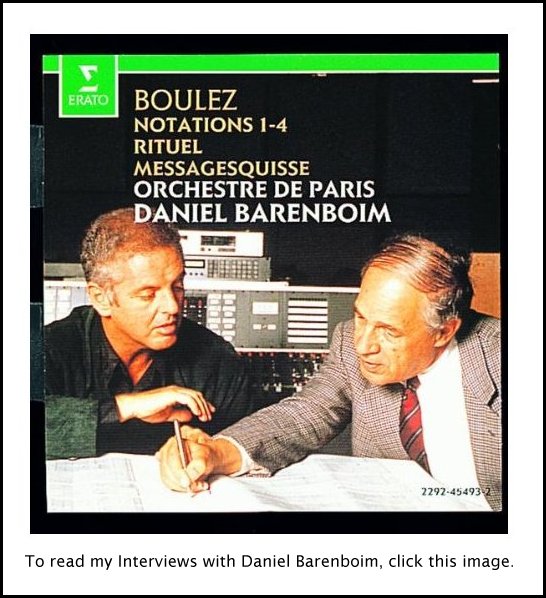 PB: I haven’t seen that until now, but it can happen. That depends on what generation it is because some of my works require very classical conducting, so there’s no problem. But in some other works there is quite a different technique of conducting. There is free choice, free cueing and so on, and some people are not at all easy with that. They don’t know what to do exactly when you have to form the material, when the material is there but not already put together. Then you have to make the gesture yourself, and not only just metrically make a gesture but to make the gesture of performing with sound bodies. You must give much more of yourself and be much more aware of the material you’re handling than if you are just conducting in the classical way.
PB: I haven’t seen that until now, but it can happen. That depends on what generation it is because some of my works require very classical conducting, so there’s no problem. But in some other works there is quite a different technique of conducting. There is free choice, free cueing and so on, and some people are not at all easy with that. They don’t know what to do exactly when you have to form the material, when the material is there but not already put together. Then you have to make the gesture yourself, and not only just metrically make a gesture but to make the gesture of performing with sound bodies. You must give much more of yourself and be much more aware of the material you’re handling than if you are just conducting in the classical way.
BD: This is not a case of your leaving, perhaps, too much for the conductor?
PB: No, I think I don’t leave too much. That’s the kind of performance which is asking from the conductor something he can give which is not above his possibilities, but he has to explore these possibilities because they were not explored during his education, and that’s exactly the point. Sometimes I’m very disappointed. When I see a work like Eclat, for instance, when you have cues to give freely which gives a very specific tension to the work because people are not really given cues in one, two, three, four, and so on, but they are given ‘yes, you play; here you play; here you play’ according to what I decide last minute. So everyone waits and so it gives a kind of tension, which is required for that. Some parts, where everything was codified with one, two, three, four, five, that’s not difficult. But the difficulty’s the art. The tension is art. I know conductors who would do my work very well
— Abbado, for instance, and Barenboim — but sometimes I am amazed. I had an experience not long ago of somebody who picked up one of my works and the tempi were really wrong, or what you can call wrong. There are metronome marks, but I’m not really a man who looks at 72 rather than 73. I know that you cannot be so accurate, and that metronome marks are just a kind of window of speed. But his speed was much below the speed which has been indicated!
BD: About 56 or something like that?
PB: Yes! [Both laugh] The piece just sagged and was unbearable to me. Then you feel very uncomfortable when you listen, and suddenly you are like the back-seat driver. You see the car coming to a crash and you cannot do anything about it. I would not have been a good instructor for driving! [Both laugh again]
BD: How can one rehearse a piece that requires this on-the-spot thinking in performance?
PB: It should be rehearsed slowly first. You rehearse and wait. Tell them I will do that so this cue and this cue for you, and you call the instrument each time so that’s the first reaction. They know to look at what they are to play. That’s generally not difficult because when it’s too difficult you could not really have this kind of attention to the cue. But you start here. You have a call for everybody, and then after that you do it silently because they must react to the vision cue. You have to do it silently and slowly, and then progressively you speed up. Then you have to force yourself to make a different order each time so they are surprised. They should notice that if I do a different order, they have to be always attentive to what I’m doing, and not just waiting for the cue.
BD: Does any of that kind of rehearsal technique transfer to standard repertoire?
PB: No, this kind of conducting does not apply to normal repertoire, but I must say that I had it much easier with this repertoire because my arms are completely free. I can give just cues for entrances, or look at the instrument and just beat the time precisely. You acquire an independence of the arms, which is much more than you could do in the repertoire generally. That’s nothing to do one to the other, but you benefit from this experience.
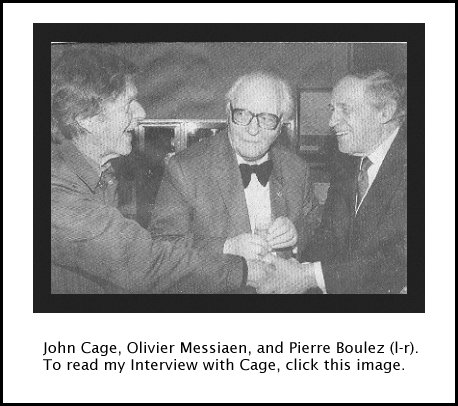 BD: When you’re conducting the standard repertoire, what can you leave for the performance, or is all the work done in rehearsal?
BD: When you’re conducting the standard repertoire, what can you leave for the performance, or is all the work done in rehearsal?
PB: The work is mainly done in rehearsal because I don’t want the orchestra to be surprised in a bad way because of erratic conducting. That is not really very valuable to me. I prefer to have a very thorough preparation, and then you give the overdrive by enjoying the performance. Then you can actually make a little bit more. It is still the line you have indicated, only it’s a steeper line or a line which goes more sudden than they expected when you were rehearsing. But that’s not irrational compared to what you have done. It is some kind of expansion of what you have done, but on the same line and in the same direction. That I find very important because then they are surprised, and they expect a surprise because if the performance is exactly like the rehearsal there is something missing. But if the performance is so different from the rehearsal and everybody’s lost and doesn’t know what to do, you have to reinforce the features but in the direction you have chosen to give them during the rehearsal.
BD: If have three or four or six or even eight performances of the same work or set of works, is each performance the same, or does each performance have a little different emphasis?
PB: The difficulty is to keep fresh when you have four concerts sometimes one after another.
BD: So how do you keep it fresh?
PB: You force yourself if you are interested in music, especially when you want to hear it properly. Maybe the first time will be more tense because it is the first time you go in front of an audience. But then there is the excitement, and the second time you are more secure in a way, less tense, less nervously tense, but then you have a more musical approach. There are different types of tension. There is the tension, what the Germans call Lampenfieber or anxiety in front of the audience. Then you have also pure nervousness, which is generally not good if you don’t dominate it. Then you have a kind of excitement with your audience when you are assured that the work will go well. You master all the conditions, and sometimes when you are repeating something too many times it’s very difficult to force yourself to overcome this once more.
BD: Think of it as one last concert?
PB: Yes, although the last one is okay because, as you say that’s the last one. It’s the ones in between that are more difficult.
BD: Do you conduct differently on the podium than you do in the recording studio?
PB: No, it is approximately the same. I am maybe more aware in a recording studio of the small mistakes, because you begin and your ear is sharp. During a performance, if the sweep is there and the vitality is there, a blurb is not heard twice. You prefer that it is not there of course, but if it is there, you accept it. But in a recording session you cannot. The difficulty is to keep the tension and the vitality with the perfection, especially when a blurb comes out. In a recording session then you begin to make inserts, one, two, three times, and the third time you really have to push yourself very hard not to think ‘once more, once more, once more’. You have to keep this freshness, and also keep the same notion of tempo because if the insert has to be used, you have to be very aware of the tempo fitting into it, especially if that’s in a large part of the work. You also need to consider the right balance so it does not just go out. Generally what I do in recording sessions is an entire part of the work. I cannot record just small bits, and I make inserts only if it is really necessary. If after two or three takes of the whole thing we don’t have it very clear, either from the balance point of view or from the instruments point of view, then I make inserts. But I’m very careful not to make just juxtaposed small bits.
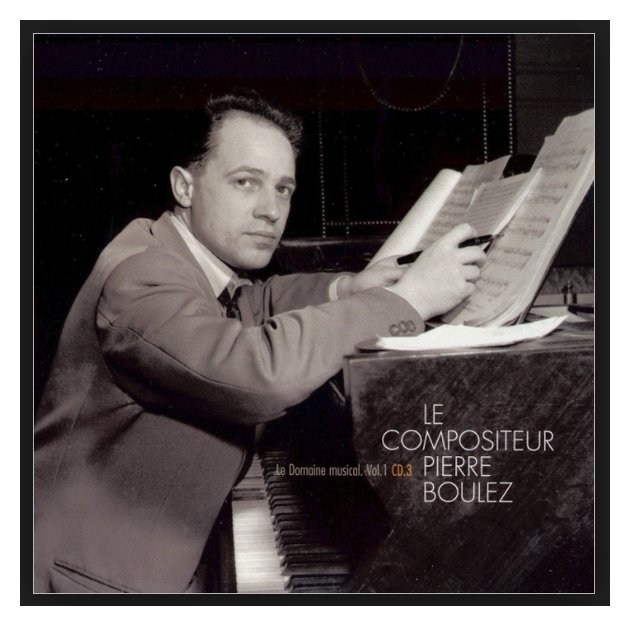 BD: When you’re giving a concert, do you ever feel that you’re competing against the record you made?
BD: When you’re giving a concert, do you ever feel that you’re competing against the record you made?
PB: No. I have no memory for my records. Sometimes I don’t recognize them, especially recordings that go back twenty years ago. I’m not hypnotized by photographs of myself. I don’t look as I was at twenty-five and then at thirty and then at thirty-five and so on. [Laughs] It is a kind of narcissistic enjoyment I don’t have at all!
BD: [With mock horror] But you don’t disown the old records, do you???
PB: No, no, I don’t disown my pictures either. [Laughs even more] I was younger and that’s it, and it is the same for recordings. I did that, and if that’s me I would not do it now this way, or on the contrary, this piece was rather good and I would like to do it again this way now. So you can’t put judgments on what you have done because you know very well that recording sessions are really very demanding, and you have very rarely the possibility of doing a recording like you want because time is measured, sometimes very strictly, and happy or not sometimes you have to move on because it costs money! I remember very, very well The Rite of Spring with the Cleveland Orchestra. We did this recording extremely quickly because we had performed the work quite a number of times over two or three years. Then I think we did the recording within four hours, which was quite an achievement. I remember very well the first session I had in the States, and I was told we could get ten minutes of finished record every hour. There are all the rules, and of course you begin and you don’t think about the rules at the time. You go to hear some takes, and because I had always recorded in Europe, especially in England, everything there was calm. But here I asked the manager of the personnel how much time we had left, and I saw him calculating. There were not those small machines then, and he calculated and said twenty-seven minutes! I thought that’s a very precise answer! [Laughs]
BD: In Europe they would have said you have a half-hour.
PB: Yes, exactly! But here it was just to the minute. It teaches you how to use the time with the maximum of efficiency, that’s for sure, but sometimes you would like a little more leeway during the session.
BD: Is there ever a chance that because of the cut and paste a recording becomes too perfect?
PB: No, it can’t be that. [Laughs] It can’t be that because if you are looking for perfection, you are beginning to be tight and stiff, and then you are looking only with the hope that the horns will not blurb again, or the strings will make the right entrance or something like that because you can’t have a mistake like that. Then you are so stiff with yourself and don’t think anymore of playing, just listening to mistakes. You have to get over that. Mistake or not, I will play. I admire very much the old generations. In the 30s and 40s we were recording just like that, and mistake or not it has been there. I find in these old recordings that there were very few mistakes indeed. The more you trust the take and that mistakes will be corrected, the more mistakes you will make. I suppose that’s the difficulty of getting through like that in a thing that is very important to me. I notice that, for instance, with some German radio orchestras because they are accustomed to record and edit for the broadcasts. They record like for the recording industry. They tape it and they make inserts and they’re editing. Then of course you have good broadcasts, but what it came sometimes to the concert, everybody was shaking because then there was no way of correcting mistakes. People would not take a chance and the performance would be not shaky, but not really outgoing. There was always this restraint character which came from the lack of agressivity.
BD: Do the best concerts result from the most risk-taking?
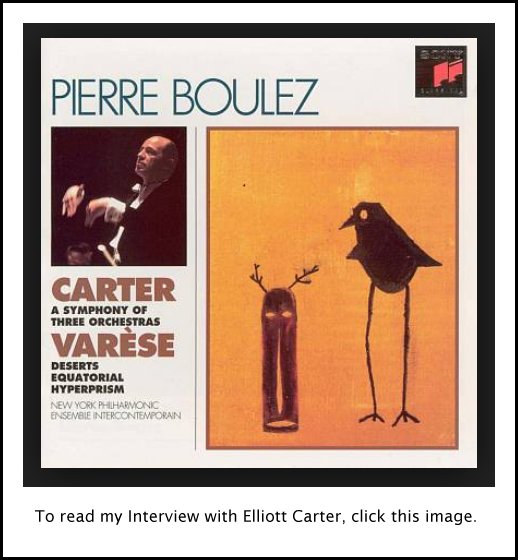 PB: Oh, I think so. You must have it. When you give a concert, you must have a certain aggressiveness to convince people. That’s like actors. In film an actor can just move a finger and everything is magnified by the screen, but actors in the theater just do that with the best intentions and will not be seen. So he has to act a little more. I don’t want music to be tight and trivial, but certainly it has to be obvious and convincing. Especially in a big hall with a big orchestra, you cannot play exactly like you play a string quartet for two other people.
PB: Oh, I think so. You must have it. When you give a concert, you must have a certain aggressiveness to convince people. That’s like actors. In film an actor can just move a finger and everything is magnified by the screen, but actors in the theater just do that with the best intentions and will not be seen. So he has to act a little more. I don’t want music to be tight and trivial, but certainly it has to be obvious and convincing. Especially in a big hall with a big orchestra, you cannot play exactly like you play a string quartet for two other people.
BD: What about the same sized orchestra in a small hall or a big hall. Do the subtleties change?
PB: Yes, certainly the performance of an orchestra changes with the hall. You are very aware of that during a tour especially. When I was with the BBC, in each tour we had at least a half an hour or three quarters of an hour’s rehearsal to listen to the hall.
BD: So that rehearsal really wasn’t for you, it was for the orchestra?
PB: No, for the orchestra and for me and also for the hall. You could adjust, so on the evening you were sure of what you were doing. Of course it was in an empty hall and for all of them it is slightly different, but that’s not a big adjustment. But when was on tour with the New York Philharmonic, then you change halls every day practically, and it’s too expensive to have a rehearsal. So you go into the hall just for the concert and then sometimes you have big surprise. You have a hall which is dry like hell, and the next day you have a very resonant hall. It takes a quarter of an hour at least to make the adjustment which is absolutely necessary. For instance in a very resonant hall, you don’t go as quickly as in a dry hall, and sometimes in a very dry hall you have to put the brake on your orchestra because they are going faster and faster because they don’t hear anything particularly!
BD: If you know that kind of tour is coming, do you purposely put an overture at the top just to get the adjustment in each hall?
PB: That’s better if you have a short work to begin with certainly, yes.
BD: You don’t start out with the big heavy piece?
PB: No, unless you are forced to do so. Even with a Mahler symphony sometimes you will hear a short piece before it.
BD: Who makes the decisions about repertoire?
PB: That depends on the countries. For instance, with the Ninth Symphonyof Mahler generally in New York people don’t do anything else, and you begin with that. That’s it. But in England, for instance, for the Proms concerts from the summer season, Proms are longer generally than during the winter season, and then even the Ninth Symphony be considered too short. So you have to put either a Mozart symphony or a Mozart concerto, or anything of this approximate duration before, which fits in the program of course.
BD: How do you decide which pieces of music from the vast literature you will program in the next season?
PB: It’s not my problem anymore. [Laughs] I choose now just for a couple of concerts I am doing, and generally I make a special choice for very special programs which are not to do generally with the big repertoire. I am concentrating on pieces which I like to do, especially pieces of the twentieth century. I don’t go back now even to the nineteenth century. There are so many people who are conducting nineteenth century anyway. They don’t need me.
BD: Are there too many conductors?
PB: There are not enough who conduct twentieth century. I’m not against the nineteenth century repertoire, but it has to be expanded quite a lot. You can’t live only on seventy-five years or a hundred years of music. It’s not enough. What I do myself is try to balance the program and to have unity or very well balanced contrast between the pieces. For me that’s very important because you cannot have a uniform program. You have to have some variety, especially when you put works together which are of a similar period. Then you have to have a great variety of contrast in the personalities of the composer, or if you have different periods of history, then you can rely on the same character reflecting in different styles. But to make programs, you have to take into account many, many problems, not counting Union problems. If you deal only with artistic problems, there are lots to consider, and it’s not always easy to make programs which are appealing and rather logical and which make a season. When I was in charge, I tried not to be uniform but in the same time people would remember a season more or less by a profile at least. If not really a main theme or a main idea, but at least a kind of profile when people say that this year I’ve heard this work, this work, this work, this work, and then the remember it as being interesting. I remember one of the years in New York there was no main theme, but I did the works related with Mr. Faust in music
— The Damnation of course by Berlioz, the Faust Symphony of Liszt, the Eighth Mahler and I planned also the Busoni Dr. Faust but it was too much. To hear three or four pieces around this theme in the season is not really forcing you down to a theme, but in the same time you remember that in this season it was this highlight. I am very much in favor of this kind of signal given to the audience about something.
BD: You resisted the urge to call it a Hell of a Season!
PB: Yes! [Both laugh]
BD: Are you pleased with a lot of the new music that you see coming from other composers, either European or American?
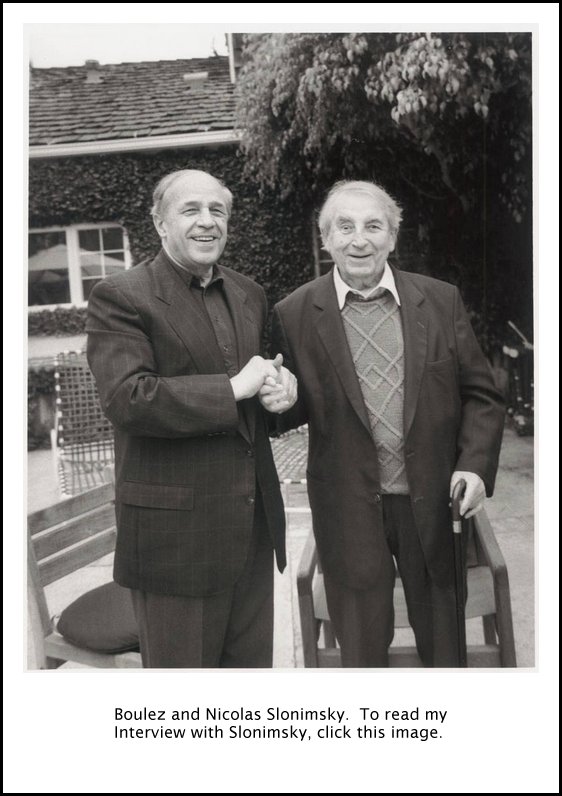 PB: Yes, I am pleased that there is new music! [Laughs] I realize there are always people writing, and even writing a lot. If you’re in a position like I am, I receive quite a lot of scores. I don’t read them all, of course. I cannot. We have a reading committee for that which changes every year because I don’t want to have the same people always. We try to find always an instrumentalist, a very young composer, a more mature composer, and some conductor so that we have four different types of personality who can judge with a very different approach. Everybody will look more or less with the eyes of his generation. You have somebody of twenty-five or twenty-eight going along with somebody of fifty, so the approach will be slightly different. So we try to change, and I change every year because then it’s not a house committee
PB: Yes, I am pleased that there is new music! [Laughs] I realize there are always people writing, and even writing a lot. If you’re in a position like I am, I receive quite a lot of scores. I don’t read them all, of course. I cannot. We have a reading committee for that which changes every year because I don’t want to have the same people always. We try to find always an instrumentalist, a very young composer, a more mature composer, and some conductor so that we have four different types of personality who can judge with a very different approach. Everybody will look more or less with the eyes of his generation. You have somebody of twenty-five or twenty-eight going along with somebody of fifty, so the approach will be slightly different. So we try to change, and I change every year because then it’s not a house committee
— which is the worst in all cases. But it changes, and we are very, very open. What we ask for is that there is some kind of direction in the music, and not to go on imitation or something which is immature and not interesting, or out of this period completely.
BD: Do you look at the scores that are recommended by the committee?
PB: Yes, when the committee has selected quite a lot of scores. Sometimes I receive complaints, so I look at the scores of the people who complain that they were rejected for maybe no good reason. Generally that’s very rare that they are rejected for bad reasons, but I leave everything open because I don’t like to have martyrdom on my shoulders. People should not feel that they are sacrificed to either the spirit of the house, or bad feelings about somebody, or personal relationships which are bad and so on. That is completely excluded and therefore we have a really broad choice of scores.
BD: But basically you’re pleased at what you see coming through?
PB: Yes, oh yes.
BD: Are there perhaps too many young composers coming along?
PB: Would you ask me before the Olympic Games if you have too many swimming pools? No.
BD: But I might ask if you have too many swimmers.
PB: No, because the more swimmers you have, the more chance you have to have a winner. For me, that’s essential. Of course I can’t imagine that all these composers will be big personalities of the future, but there must be encouragement to produce. The relationship with the audience, if they are selected, will teach something, and the audience will learn something also from that. Certainly it is more for me, as I was always against the
‘ivory tower’. Of course you write for yourself. You don’t write for an audience, but you need to present yourself in front of an audience and to have your work performed, and experience this kind of nervous tension which is explicit in a performance. You are there and you listen to that. When you listen alone you think it is all right, but when you listen in the middle of the audience, your pulse does not beat in the same way, certainly not. For these young people to hear the work in front of an audience is a very good lesson. I do that, and the more we can play with a certain amount of quality, the more I will inscribe in the programs. Maybe the first work is not really the top, but the second or the third will be much better.
BD: Is there a place in the repertoire for the second and even third-line works?
PB: Yes, I think so. Even in the classical repertoire I am amazed. I am amazed that the music museums are made only of peaks. I don’t like the musical culture which is shaped like a Swiss cheese full of holes! You see only big works or those of a well-known composer. If you play an unknown symphony of Haydn, you know that’s by Haydn. That isn’t very interesting, but that’s a chain. In the art museum you have Rembrandt, but you also see all the people who painted in the same time and you know why Rembrandt came above the other one because you are aware of the quality. Otherwise if you only hear the same works constantly, you don’t have any comparison. You don’t have any historical view. It makes you look at history like frozen things. You unpack the frozen thing, and then you pack it back, and that’s what I find really horrifying. For me, it is not culture. It’s just the worst aspect of consuming.
BD: So what, for you, is the ultimate purpose of music?
PB: To enlarge your vision of the world. It seems very pretentious to say that, or very Germanic in a way, as I mean Weltanschauung, but that’s that. It’s not only entertaining yourself with nice sounds. If it is only that, it’s not really very rich. I like music as part of my general culture. I go to theater, I go to the art museum, I read a book, so I want to have music as part of this culture. There are of course various aspects or various levels of culture. I don’t want to be always like that and only listen in the most severe way. Certainly there are different levels. I can hear a Divertimentoby Mozart and be entertained by that. Mozart did not mean more than that, but it was always very high-level entertaining. But if you hear Don Giovannior if you hear Wozzeck, you have to be involved much more than just spending two hours digesting so we can think of other things later.
BD: Then where is the balance then between the artistic achievement and the entertainment value?
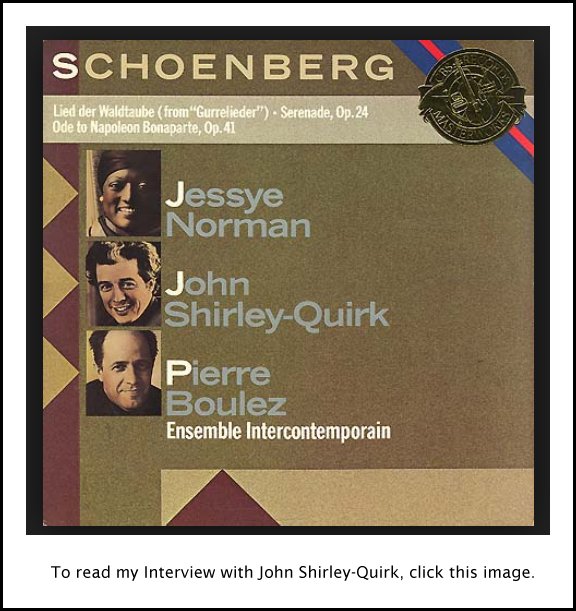 PB: Entertainment is value. I don’t contest this, but you cannot live only on entertainment. Entertainment is only part of the culture, and not the biggest part of the culture. There are layers of culture and sometimes you want to go deeper in yourself. Like in life, you cannot listen to jokes all day. You listen to three or four jokes and then that’s enough! Entertainment is a little bit like that. If you are entertained, after a while you see the shortcomings of the situation. Therefore I think the musical life has to reflect all these aspects. Among historical aspects, entertainment as really a deepening feeling about human beings. Everything goes round human beings, and you cannot really exclude music of the human being just because it is sometimes pleasant or sometimes unpleasant. It is there not only for just listening, but to try to understand what is impossible to express by words. It is simply that.
PB: Entertainment is value. I don’t contest this, but you cannot live only on entertainment. Entertainment is only part of the culture, and not the biggest part of the culture. There are layers of culture and sometimes you want to go deeper in yourself. Like in life, you cannot listen to jokes all day. You listen to three or four jokes and then that’s enough! Entertainment is a little bit like that. If you are entertained, after a while you see the shortcomings of the situation. Therefore I think the musical life has to reflect all these aspects. Among historical aspects, entertainment as really a deepening feeling about human beings. Everything goes round human beings, and you cannot really exclude music of the human being just because it is sometimes pleasant or sometimes unpleasant. It is there not only for just listening, but to try to understand what is impossible to express by words. It is simply that.
BD: Are we getting the new masterpieces coming along?
PB: Certainly we are getting masterpieces coming along. Every generation has put masterpieces. It is only that you see they are masterpieces after because you don’t see history. People who want to be historical when they are there are not historical precisely because these conclusions are made later. You cannot see yourself as part of history and be out of historical context and in historical context. That’s a view which is impossible. You do something and then later people will tell exactly what part you are. You can be conscious of what elements you are, more or less. You are conscious of your genealogical tree, though not always very precisely. But you are aware and you know from where you came, but for the future you cannot know. There were readjustments that were done when the history was sometimes very quickly severe. If I look in the period between the two Wars in France or in Europe generally, there was a marvelous period before the First World War. In 1910, 1915, 1917, 1918, there were a lot of discoveries in all fields, especially in music. There were some great works, and then after in this period of Two Wars, there was a tendency to be so-called classical, and then lots of people wanted to be historically classical. When you see that now, you see it’s just fake. That’s like a plastic Greek temple, for instance, and that does not fit at all. History has been very quick to look at that in a very severe way, and to make this period before and during the First World War a really very, very strong period in inventiveness and creativity. Then the period in between was like something which is really tired and not interesting, short of ideas and trying to fulfill an ideal which was very artificial and uninteresting. And I suppose on our period there will be, certainly in forty years from now, the same type of judgments, but we cannot make them right now. I can begin a little bit of my trajectory, and although I don’t regret my trajectory, I see very well the excesses of the illogicism of this trajectory. It seemed to me logical at the time and seemed to me not foolish, but it is unnecessary right now. I had to go through this path, and if you go like [demonstrates an up and down motion], okay. If you want to join this point, you have to go sometimes like that, and I could have done that really straight, but finally I had to do that to arrive where I am.
BD: You have to have the hills and valleys in your career!
PB: Exactly, exactly.
BD: Is the music of Pierre Boulez great?
PB: [Laughs] It is certainly not for me to say that was great. That would be the least thing I will think of.
BD: What advice do you have for young composers just coming along, or even for middle-aged composers?
 PB: They must find their way! There is no advice to give. I was a very bad teacher because I never gave any advice. I was criticizing the pieces which were presented to me from my point of view, and I said things from my point of view. If I would be you, as one says generally, I would not have written that, but I am not you, so you can write it if you want! That’s all I can say. I can say, for instance, technically that’s not good or the ideas are not terribly strong, or the ideas are very interesting but not expanded properly. That I could say, all kinds of technical remarks, but not to speak about creative ideas. That’s you. You find your way or you don’t find your way, but no advice will be of any help. You have a lot of great performers who have very poor students, and you have rather mediocre performers who are excellent teachers and have wonderful students. I think for composition it is almost the same. What I think you can learn in composition is the process of writing music. That’s certainly counterpoint, harmony and things like that in a technical background. But once you come to composition really, there is nothing to be taught. You can show what you did, how is your way, how you can take a score from somebody else and then develop something from that. That you can teach more or less, but to compose, really that you cannot teach. I believe very much in the kind of shock in teaching, in composition at least. You meet a personality, or a person meets you and then there is a kind of explosive shock which is very quick. If you don’t have it, you can spend years and it will never happen, and if you have it, you don’t need years, you need only maybe hours and it will be enough. Therefore I am highly skeptical about teaching composition, and therefore after three years I gave up!
PB: They must find their way! There is no advice to give. I was a very bad teacher because I never gave any advice. I was criticizing the pieces which were presented to me from my point of view, and I said things from my point of view. If I would be you, as one says generally, I would not have written that, but I am not you, so you can write it if you want! That’s all I can say. I can say, for instance, technically that’s not good or the ideas are not terribly strong, or the ideas are very interesting but not expanded properly. That I could say, all kinds of technical remarks, but not to speak about creative ideas. That’s you. You find your way or you don’t find your way, but no advice will be of any help. You have a lot of great performers who have very poor students, and you have rather mediocre performers who are excellent teachers and have wonderful students. I think for composition it is almost the same. What I think you can learn in composition is the process of writing music. That’s certainly counterpoint, harmony and things like that in a technical background. But once you come to composition really, there is nothing to be taught. You can show what you did, how is your way, how you can take a score from somebody else and then develop something from that. That you can teach more or less, but to compose, really that you cannot teach. I believe very much in the kind of shock in teaching, in composition at least. You meet a personality, or a person meets you and then there is a kind of explosive shock which is very quick. If you don’t have it, you can spend years and it will never happen, and if you have it, you don’t need years, you need only maybe hours and it will be enough. Therefore I am highly skeptical about teaching composition, and therefore after three years I gave up!
BD: Do you have any advice for conductors?
PB: I have no advice there either because myself I have been a purely self-taught conductor. I’ve never learned conducting, really. I learned on the spot, in the theater conducting incidental music for a group of musicians for the Jean-Louis Barrault theater. Then I used the skills I found for myself progressively, and expanded them to bigger and bigger groups, and especially for contemporary music because I was the less expensive conductor for my own organization! I did not have to pay myself! So I could conduct progressively with musicians. We were new to this music in the early ‘50s, so we learned together how to perform it and I learned how to conduct it. I had conducting classes twice in my life in Basel. The composition class was also in Basel, in Switzerland. It’s like driving a race car or a general car. When you are put into the car you learn to drive a car and what you have to do. You have to put the motor on, and learn how go and to brake! [Laughs] The brake is very important, and that’s exactly what is also important in conducting
— how to begin and how to stop! In between you have to learn all by yourself.
BD: What advice do you have for audiences?
PB: To come and listen. That’s a very simple advice, but more seriously I would like to say they have to come with an open mind. That’s not enough, but they need to know that we are only a point in history, and even if we don’t want it, we will be pushed out. It’s absolutely inexorable. You know you cannot resist that. The movement of history goes very slowly sometimes, but absolutely forward without any pity for yourself. It is much more enjoyable to try to discover his own time than to resist it, because resistance to time is painful. Try to go with it. It’s sometimes enjoyable at least!
BD: Do you conduct anymore operas anymore?
PB: No. Not that I am against it or I don’t want to do it, but it takes too much time. When you are interested as I am in a production of an opera, I choose the director, generally, or I agree with the director who is chosen, so I want to work with him. That way the musical side and the theatrical side are exactly on the same wavelength. For instance when I did the Ring, in ’75 I already began to work with Chéreau. Then in ’76, which was première, the direction not perfect because you cannot do everything well for the first time with this type of work. Then progressively we worked and worked and worked, and then our fourth and fifth year were really good. I involved myself. I would not come, for instance, just eight days before the premiere and rehearse. I don’t find that’s very, very fantastic from the theatrical point of view. What I want is to be involved with the director and to see what I can do. Sometimes I can correct him, sometimes I get input from him. That’s an exchange work and that’s interesting, but for that you must devote two or three months just for a single production.
BD: When we last talked, you were thinking of writing an opera. Has that come to pass yet?
PB: It’s nearer its goal than it was before. [Laughs] That’s all I can say for the time being.
BD: Would you conduct it, or would you rather direct it?
PB: I would neither direct nor conduct, but attend. If the project materializes, I would use quite a lot also of electronic technique, and then I prefer to have a look at everything. Sometimes it’s very disturbing. I’m obliged to tell a musician to conduct for me because where I am, once I am conducting, I am not aware of the balance between what comes from the instruments far away because of what I am conducting in front of me. So therefore I have to check it from the hall.
BD: I would think that would be almost universally true for anything you conduct
— that the podium is the worst place to listen.
PB: No, no. It does not give you maybe the right image or the definite image, but you have to sit in a seat if you want to have perfect image. With instruments which are not transformed or not amplified, then you can have a good picture on the podium. But there, with the distance and with loudspeakers and the relationship with the dynamics, then you cannot really judge properly. Then it has to be checked, either by some collaborator you trust or some musician you trust. For this opera, especially with stage involved and everything like that, I prefer to be an observer more than a participant myself.
BD: Are you coming back to Chicago?
PB: I cannot tell you yet. I think I will come back certainly, but I cannot tell you when, and under what circumstances. [Note: Boulez first appeared with the Chicago Symphony on subscription concerts in February 1969 conducting Debussy’s Jeux, Bartók’s First Piano Concerto with Daniel Barenboim, Webern’s Passacaglia and Six Pieces for Orchestra, and Messiaen’s Et exspecto resurrectionem mortuorum. In 1995, he would be named Principal Guest Conductor, and in 2006 Conductor Emeritus.]
BD: The Chicago Symphony responds to your music?
PB: Oh, very much so, yes, very much.
BD: They’re very open to it?
PB: There is no problem, no problem at all. On the contrary, our relationship is very good. It’s an orchestra not only of reputation, but the reputation is justified.
BD: Are there orchestras that the reputation is not justified.
PB: No, I don’t say that, but sometimes you hear an orchestra and you are disappointed by the level which is not exactly what you expected. But here in this case the level is extremely high.
BD: Whatever you want or ask, you get?
PB: Oh, yes.
BD: Does that make you ask for more?
PB: Yes, certainly because you go quicker, and you begin here from a level where sometimes the difficulties are hard to reach. So you can deal much more with the music than the technicalities because there are a lot of technicalities which are absorbed already. For me, the main superiority of a big high-level orchestra is precisely that. It’s not that you’re enjoying this kind of technical approach, which is almost perfect, but this level you begin with allows you to go much more into performing.
BD: I am glad we give you such an instrument to work with. Thank you again for speaking with me today.
PB: You’re very welcome.
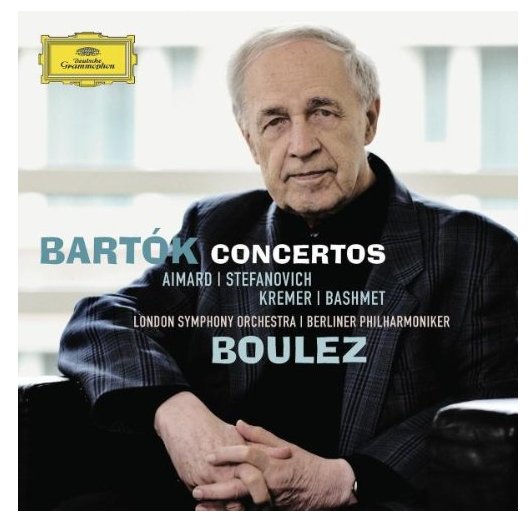
To read my Interview with Gidon Kremer, click HERE.
To read my Interview with Yuri Bashmet, click HERE.
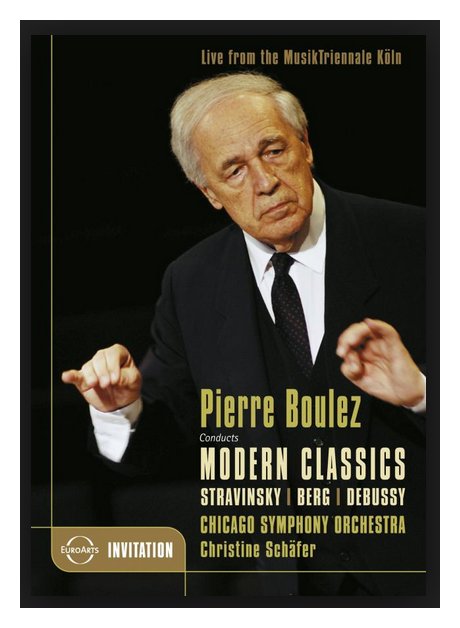
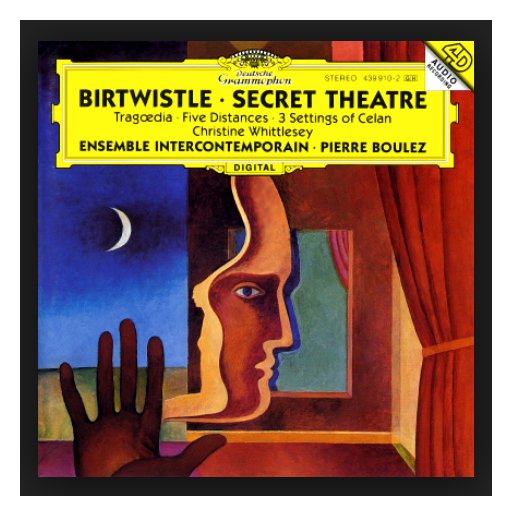
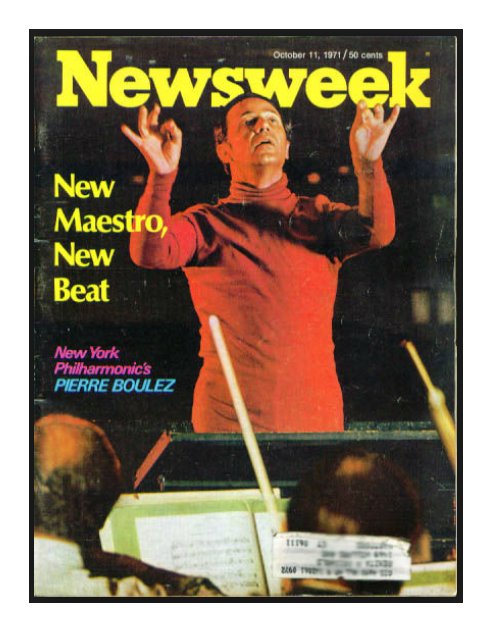
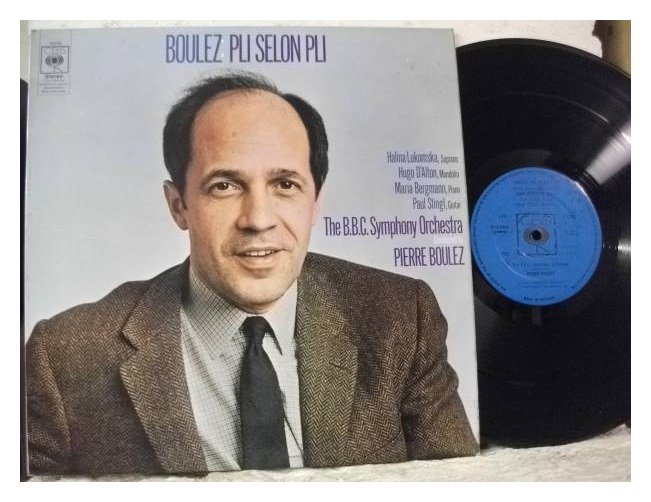
© 1986 & 1987 Bruce Duffie
These conversations were recorded in Chicago on February 20, 1986 and October 26, 1987. Portions were broadcast on WNIB in 1987, 1995 and 2000; on WNUR in 2005 and 2010; and on Contemporary Classical Internet Radio in 2005, 2007 and 2010. This transcription was made in 2014, and posted on this website early in 2015. My thanks to British soprano Una Barry for her help in preparing this website presentation.
To see a full list (with links) of interviews which have been transcribed and posted on this website, click here.
Award- winning broadcaster Bruce Duffie was with WNIB, Classical 97 in Chicago from 1975 until its final moment as a classical station in February of 2001. His interviews have also appeared in various magazines and journals since 1980, and he now continues his broadcast series on WNUR-FM, as well as on Contemporary Classical Internet Radio.
You are invited to visit his websitefor more information about his work, including selected transcripts of other interviews, plus a full list of his guests. He would also like to call your attention to the photos and information about his grandfather, who was a pioneer in the automotive field more than a century ago. You may also send him E-Mailwith comments, questions and suggestions.
